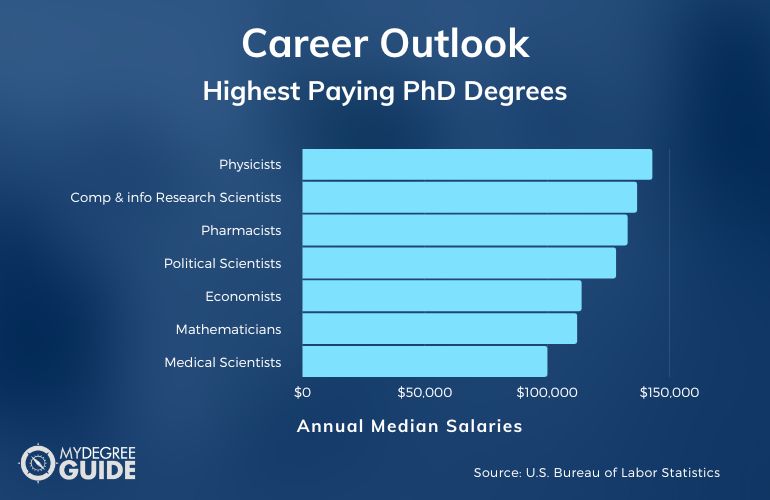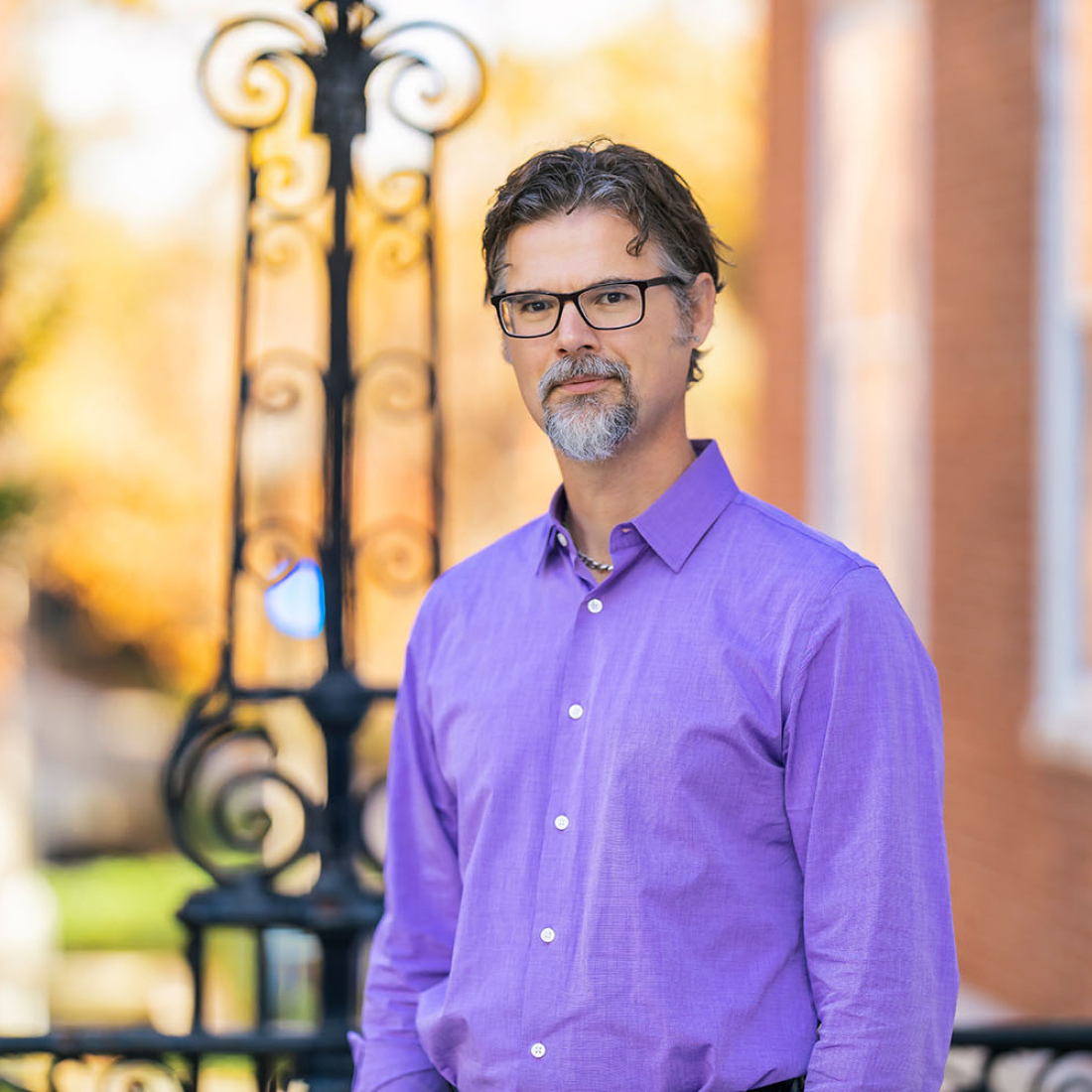What Can You Get a PhD in? [Doctorate Guide]
What can you get a PhD in? This question is frequently asked by people who want to expand their knowledge and unlock new career paths by earning a doctoral degree.

Editorial Listing ShortCode:
You can earn a PhD in a wide variety of fields, ranging from anthropology to zoology. This guide explores some of the most popular types of PhDs, associated careers, and factors to consider when selecting an online PhD program.

What Can You Get a PhD In?
Colleges and universities offer doctorate programs in a broad range of disciplines, so aspiring PhD students have many options.
The best PhDs to get depend on your professional goals, interests, and previous education. Here are ten of the most common PhDs that people pursue.
Select the program that most interests you to jump to that section of the guide:
- Online PhD in Anthropology
- Online PhD in Biology
- Online PhD in Business
- Online PhD in Clinical Psychology
- Online PhD in Computer Science
- Online PhD in Education
- Online PhD in English
- Online PhD in Psychology
- Online PhD in Nursing
- Online PhD in Physical Therapy
The program that’s best for you will depend on your personal interests and professional goals.
PhD in Anthropology

You can deepen your understanding of anthropological research methods and theories with a PhD in Anthropology.
Many programs allow doctoral students to specialize in a subfield, such as archeology, biological anthropology, and sociocultural anthropology. Courses vary by program but typically cover data analysis, field research methods, and public archeology.
Graduates who earn this degree may go on to work as college professors, forensic anthropologists, and museum curators.
PhD in Biology

A PhD in Biology prepares students to contribute new knowledge to the biological sciences. Students can focus on various areas of specialty, including computational biology, ecology, and genetic epidemiology.
These programs often have interdisciplinary curricula that allow students to study advanced biological concepts and research methods. Course subjects may include biochemistry, contemporary biology, molecular neuroscience, and statistics. Current professionals work in bioinformatics, biotech, education, healthcare, and other industries.
PhD in Business

A PhD in Business trains business leaders and researchers. Students learn how to use advanced financial models and strategies to solve complex business issues.
Business PhD programs frequently teach subjects like accounting, consumer behavior, industrial organization, and microeconomics. Additionally, they cover research methods like econometrics and statistical analysis.
Graduates can use their business knowledge and skills to become business consultants, C-suite executives, economists, and professors.
PhD in Clinical Psychology

You can enrich your understanding of the human psyche with a PhD in Clinical Psychology. This degree focuses on researching mental health issues and psychological science. Students also learn how to apply their knowledge in clinical settings.
Typically, courses cover adult psychopathology, clinical interviewing, professional ethics, and psychological assessment. Students may also be required to complete clinical practicums. Graduates often pursue careers as child psychologists, neuropsychologists, and medical psychologists.
PhD in Computer Science

A PhD in Computer Science allows students to expand their knowledge of advanced computer systems and theories.
Curricula often cover a broad range of topics, like algorithms, data management, and random computing. Additionally, this degree trains students to conduct cutting-edge research in subfields of computer science, such as artificial intelligence and cryptography.
Graduates frequently work as chief technology officers, computer and information research scientists, and senior software engineers.
PhD in Education

If you want to research educational approaches and theories, you might consider a PhD in Education. This academic degree trains students to develop new learning methods and promote more effective teaching.
Common courses include advanced qualitative methodology, educating diverse learners, and instructional design. Also, many students specialize in higher education, literacy, special education, and other niches. Current professionals with this degree often work in teaching, administrative, and research positions in colleges and K-12 schools.
PhD in English

A PhD in English gives students the opportunity to interpret, theorize, and teach literature, film, and other types of media.
Courses cover literature from a variety of cultures, genres, and periods, such as children’s literature and Victorian literature. Moreover, these programs often promote interdisciplinary research that engages with history, psychology, and other fields. This degree can help you qualify for a position as a college professor, editor, or technical writer.
PhD in Psychology

A PhD in Psychology prepares students to conduct independent research on human cognition, behavior, and mental processes.
Students also learn how to implement clinical research methods and design experiments with human subjects. This research-intensive degree covers subjects like affective science, developmental psychology, professional ethics, and history and systems of psychology.
Additionally, many programs include clinical practicums. Graduates frequently work as academic researchers, clinical psychologists, and market researchers.
PhD in Nursing

A PhD in Nursing gives students a strong theoretical foundation in healthcare delivery and nursing science.
Standard course topics may include grant writing, leadership for nurse scientists, and methods in clinical research. This degree also trains students to apply advanced research methods to develop innovative approaches to patient care and improve healthcare policies.
A PhD in Nursing can unlock careers in clinical research, health policy, and nonprofit organizations.
PhD in Physical Therapy

A PhD in Physical Therapy allows students to research the science of physical therapy and educate others about the latest approaches to treating ill, injured, and disabled patients.
The curriculum typically addresses subjects like applied physiology, movement science, and prosthetics. Students also learn how to treat patients in clinical settings. This degree helps prepares students for specialized physical therapy careers in acute care, oncology, sports, and other areas.
How to Choose a PhD Program

The right PhD program for you aligns with your goals and sets you up for academic and professional success.
These considerations can help you compare online PhD programs :
- Faculty reputation . Prestigious faculty can assist with networking and connect you with exciting professional opportunities, such as presenting at top conferences.
- Funding opportunities . Many PhD programs offer complete funding packages, which may include stipends and other benefits.
- Placement rates . Programs that place alumni in tenure-track academic jobs and high-paying industry positions may provide excellent career support.
- Research areas . It’s strategic to look for a program that offers courses and extracurricular activities related to your interests. For instance, an English PhD program with speculative fiction courses might be ideal if you want to study science fiction writers.
Additionally, you can contact current PhD students to get a sense of the program’s culture and learn about their experiences.
Do You Need a PhD to Be a Professor?

You don’t always need a PhD to become a professor . The requirements vary by institution and position.
Some colleges hire people with master’s degrees and relevant industry experience to teach freshman-level courses. For instance, someone with an MBA and several years of work experience might teach undergraduate finance courses.
Schools that require a terminal degree may also accept a doctorate degree from an accredited university, even when it’s not a PhD. A professional doctorate degree focuses on practical applications of knowledge, while a PhD emphasizes original research.
How Hard Is It to Get Into a Ph.D. Program?

If you want to learn how to get a PhD, you can start by researching admissions criteria for online programs in your field. Requirements vary by program, so some schools may be more difficult to get into.
Here are some common admissions requirements:
- Bachelor’s or master’s degree in a relevant field
- GRE scores (only some schools require them)
- CV or resume
- Personal statement
- Letters of recommendation
- Writing sample
- Interview with the admissions committee
The specific requirements influence how challenging it is to get into a particular program, so it’s beneficial to research the criteria ahead of time.
What Is the Easiest PhD to Get?

The difficulty level of any PhD is highly subjective. But choosing a quality PhD program can increase the likelihood that you finish your degree on schedule.
A PhD program with these qualities can help facilitate your success:
- Classes that align with your research focus
- Knowledgeable faculty who enjoy mentoring graduate students
- Full-funding packages
- Student support services, like mental health counseling
- Professional development workshops
- State-of-the-art research facilities
- Clear program milestones
Additionally, you may finish your doctoral degree faster. A program with less requirements makes it one of the easiest PhDs to get such as fewer credit hours or doesn’t include a dissertation component.
What Are Some of the Highest Paying PhD Degrees I Can Get?

Many careers that require an advanced degree have lucrative median salaries. According to the Bureau of Labor Statistics , here are the median salaries of ten high-paying careers often pursued by people with PhDs:
- Physicists — $142,850
- Computer and information research scientists — $136,620
- Pharmacists — $132,750
- Political scientists — $128,020
- Economists — $113,940
- Mathematicians — $112,110
- Medical scientists — $99,930
- Physical therapists — $97,720
- Clinical and counseling psychologists — $90,130
- Postsecondary business teachers — $88,790
Many factors can affect salaries and job availability, including geographic location, skills, work experience, and your PhD program’s reputation.
Does It Matter Where You Get Your PhD?

The institution you choose for your PhD can impact your academic performance, career trajectory, and personal life.
Choosing a program that offers financial support can give you more time to focus on your studies and develop marketable skills. Additionally, you may find it easier to conduct and publish innovative research with access to leading faculty and top facilities.
Employers often consider a school’s reputation when considering job candidates, so selecting a prestigious program could boost your chances of landing a preferred position.
Earning Your PhD Degree Online

What can I get a PhD in? Colleges and universities offer a broad range of doctoral programs in numerous disciplines. These degrees enable you to study advanced concepts in your chosen field and immerse yourself in the world of academic research.
Graduates use their PhDs to pursue a variety of careers in academia, government agencies, nonprofit organizations, and the private sector. Many jobs that require graduate degrees offer lucrative wages and other benefits, such as academic tenure.
If you want to build your expertise and perform ground-breaking research, you can begin your journey by researching online PhD programs from accredited universities.

Doctor of Philosophy in Education

Additional Information
- Download the Doctoral Viewbook
- Admissions & Aid
The Harvard Ph.D. in Education trains cutting-edge researchers who work across disciplines to generate knowledge and translate discoveries into transformative policy and practice.
Offered jointly by the Harvard Graduate School of Education and the Harvard Kenneth C. Griffin Graduate School of Arts and Sciences, the Ph.D. in Education provides you with full access to the extraordinary resources of Harvard University and prepares you to assume meaningful roles as university faculty, researchers, senior-level education leaders, and policymakers.
As a Ph.D. candidate, you will collaborate with scholars across all Harvard graduate schools on original interdisciplinary research. In the process, you will help forge new fields of inquiry that will impact the way we teach and learn. The program’s required coursework will develop your knowledge of education and your expertise in a range of quantitative and qualitative methods needed to conduct high-quality research. Guided by the goal of making a transformative impact on education research, policy, and practice, you will focus on independent research in various domains, including human development, learning and teaching, policy analysis and evaluation, institutions and society, and instructional practice.
Curriculum Information
The Ph.D. in Education requires five years of full-time study to complete. You will choose your individual coursework and design your original research in close consultation with your HGSE faculty adviser and dissertation committee. The requirements listed below include the three Ph.D. concentrations: Culture, Institutions, and Society; Education Policy and Program Evaluation; and Human Development, Learning and Teaching .
We invite you to review an example course list, which is provided in two formats — one as the full list by course number and one by broad course category . These lists are subject to modification.
Ph.D. Concentrations and Examples
Summary of Ph.D. Program
Doctoral Colloquia In year one and two you are required to attend. The colloquia convenes weekly and features presentations of work-in-progress and completed work by Harvard faculty, faculty and researchers from outside Harvard, and Harvard doctoral students. Ph.D. students present once in the colloquia over the course of their career.
Research Apprenticeship The Research Apprenticeship is designed to provide ongoing training and mentoring to develop your research skills throughout the entire program.
Teaching Fellowships The Teaching Fellowship is an opportunity to enhance students' teaching skills, promote learning consolidation, and provide opportunities to collaborate with faculty on pedagogical development.
Comprehensive Exams The Written Exam (year 2, spring) tests you on both general and concentration-specific knowledge. The Oral Exam (year 3, fall/winter) tests your command of your chosen field of study and your ability to design, develop, and implement an original research project.
Dissertation Based on your original research, the dissertation process consists of three parts: the Dissertation Proposal, the writing, and an oral defense before the members of your dissertation committee.
Culture, Institutions, and Society (CIS) Concentration
In CIS, you will examine the broader cultural, institutional, organizational, and social contexts relevant to education across the lifespan. What is the value and purpose of education? How do cultural, institutional, and social factors shape educational processes and outcomes? How effective are social movements and community action in education reform? How do we measure stratification and institutional inequality? In CIS, your work will be informed by theories and methods from sociology, history, political science, organizational behavior and management, philosophy, and anthropology. You can examine contexts as diverse as classrooms, families, neighborhoods, schools, colleges and universities, religious institutions, nonprofits, government agencies, and more.
Education Policy and Program Evaluation (EPPE) Concentration
In EPPE, you will research the design, implementation, and evaluation of education policy affecting early childhood, K–12, and postsecondary education in the U.S. and internationally. You will evaluate and assess individual programs and policies related to critical issues like access to education, teacher effectiveness, school finance, testing and accountability systems, school choice, financial aid, college enrollment and persistence, and more. Your work will be informed by theories and methods from economics, political science, public policy, and sociology, history, philosophy, and statistics. This concentration shares some themes with CIS, but your work with EPPE will focus on public policy and large-scale reforms.
Human Development, Learning and Teaching (HDLT) Concentration
In HDLT, you will work to advance the role of scientific research in education policy, reform, and practice. New discoveries in the science of learning and development — the integration of biological, cognitive, and social processes; the relationships between technology and learning; or the factors that influence individual variations in learning — are transforming the practice of teaching and learning in both formal and informal settings. Whether studying behavioral, cognitive, or social-emotional development in children or the design of learning technologies to maximize understanding, you will gain a strong background in human development, the science of learning, and sociocultural factors that explain variation in learning and developmental pathways. Your research will be informed by theories and methods from psychology, cognitive science, sociology and linguistics, philosophy, the biological sciences and mathematics, and organizational behavior.
Program Faculty
The most remarkable thing about the Ph.D. in Education is open access to faculty from all Harvard graduate and professional schools, including the Harvard Graduate School of Education, the Faculty of Arts and Sciences, the Harvard Kennedy School, the Harvard Law School, Harvard Medical School, and the Harvard School of Public Health. Learn about the full Ph.D. Faculty.

Jarvis R. Givens
Jarvis Givens studies the history of American education, African American history, and the relationship between race and power in schools.

Paul L. Harris
Paul Harris is interested in the early development of cognition, emotion, and imagination in children.

Meira Levinson
Meira Levinson is a normative political philosopher who works at the intersection of civic education, youth empowerment, racial justice, and educational ethics.

Luke W. Miratrix
Luke Miratrix is a statistician who explores how to best use modern statistical methods in applied social science contexts.

Eric Taylor
Eric Taylor studies the economics of education, with a particular interest in employer-employee interactions between schools and teachers hiring and firing decisions, job design, training, and performance evaluation.

Paola Uccelli
Paola Ucelli studies socio-cultural and individual differences in the language development of multilingual and monolingual students.

View Ph.D. Faculty
Dissertations.
The following is a complete listing of successful Ph.D. in Education dissertations to-date. Dissertations from November 2014 onward are publicly available in the Digital Access to Scholarship at Harvard (DASH) , the online repository for Harvard scholarship.
- 2022 Graduate Dissertations (265 KB pdf)
- 2021 Graduate Dissertations (177 KB pdf)
- 2020 Graduate Dissertations (121 KB pdf)
- 2019 Graduate Dissertations (68.3 KB pdf)
Student Directory
An opt-in listing of current Ph.D. students with information about their interests, research, personal web pages, and contact information:
Doctor of Philosophy in Education Student Directory
Introduce Yourself
Tell us about yourself so that we can tailor our communication to best fit your interests and provide you with relevant information about our programs, events, and other opportunities to connect with us.
Program Highlights
Explore examples of the Doctor of Philosophy in Education experience and the impact its community is making on the field:

The Human Element of Data and AI
Gahyun Callie Sung's journey to HGSE and the LIT Lab is reflected in her research into data and using AI to improve student outcomes

Improving the Teacher Workforce
With her research work, doctoral marshal Mary Laski, Ph.D.'24, is trying to make teaching in K–12 schools more sustainable and attractive
- Bipolar Disorder
- Therapy Center
- When To See a Therapist
- Types of Therapy
- Best Online Therapy
- Best Couples Therapy
- Best Family Therapy
- Managing Stress
- Sleep and Dreaming
- Understanding Emotions
- Self-Improvement
- Healthy Relationships
- Student Resources
- Personality Types
- Guided Meditations
- Verywell Mind Insights
- 2024 Verywell Mind 25
- Mental Health in the Classroom
- Editorial Process
- Meet Our Review Board
- Crisis Support
Getting a Ph.D. in Psychology
Kendra Cherry, MS, is a psychosocial rehabilitation specialist, psychology educator, and author of the "Everything Psychology Book."
:max_bytes(150000):strip_icc():format(webp)/IMG_9791-89504ab694d54b66bbd72cb84ffb860e.jpg)
Emily is a board-certified science editor who has worked with top digital publishing brands like Voices for Biodiversity, Study.com, GoodTherapy, Vox, and Verywell.
:max_bytes(150000):strip_icc():format(webp)/Emily-Swaim-1000-0f3197de18f74329aeffb690a177160c.jpg)
Verywell / Evan Polenghi
Ph.D. vs. Psy.D.
Job opportunities, earning a degree, specialty areas, alternatives.
Getting a Ph.D. in psychology can open up a whole new world of career opportunities. For many careers paths in psychology-related career paths, a doctoral degree is necessary to obtain work and certification. A Ph.D. is one option, but it is not the only educational path that's available to reach some of these goals.
A Ph.D., or doctor of philosophy, is one of the highest level degrees you can earn in the field of psychology . If you're considering pursuing a graduate degree, you might be wondering how long it takes to earn a Ph.D. in psychology . Generally, a bachelor's degree takes four years of study. While a master's degree requires an additional two to three years of study beyond the bachelor's, a doctoral degree can take between four to six years of additional graduate study after earning your bachelor's degree.
Recently, a new degree option known as the Psy.D. , or doctor of psychology, has grown in popularity as an alternative to the Ph.D. The type of degree you decide to pursue depends on a variety of factors, including your own interests and your career aspirations.
Before deciding which is right for you, research your options and decide if graduate school in psychology is even the best choice for you. Depending on your career goals, you might need to earn a master's or doctoral degree in psychology in order to practice in your chosen field. In other instances, a degree in a similar subject such as counseling or social work may be more appropriate.
A doctorate in psychology is required if you want to open your own private practice.
If you want to become a licensed psychologist, you must earn either a Ph.D. or a Psy.D. in clinical or counseling psychology.
In most cases, you will also need a doctorate if you want to teach and conduct research at the college or university level. While there are some opportunities available for people with a master's degree in various specialty fields, such as industrial-organizational psychology and health psychology , those with a doctorate will generally find higher pay, greater job demand, and more opportunity for growth.
In order to earn a Ph.D. in psychology, you need to first begin by earning your bachelor's degree. While earning your undergraduate degree in psychology can be helpful, students with bachelor's degrees in other subjects can also apply their knowledge to psychology Ph.D. programs . Some students in doctorate programs may have a master's degree in psychology , but most doctorate programs do not require it.
After you’ve been admitted to a graduate program, it generally takes at least four years to earn a Ph.D. and another year to complete an internship. Once these requirements have been fulfilled, you can take state and national exams to become licensed to practice psychology in the state where you wish to work.
Once you enter the graduate level of psychology, you will need to choose an area of specialization, such as clinical psychology , counseling psychology, health psychology, or cognitive psychology . The American Psychological Association (APA) accredits graduate programs in three areas: clinical, counseling, and school psychology. If you are interested in going into one of these specialty areas, it's important to choose a school that has received accreditation through the APA.
For many students, the choice may come down to a clinical psychology program versus a counseling psychology program. There are many similarities between these two Ph.D. options, but there are important distinctions that students should consider. Clinical programs may have more of a research focus while counseling programs tend to focus more on professional practice. The path you choose will depend largely on what you plan to do after you complete your degree.
Of course, the Ph.D. in psychology is not the only graduate degree option. The Psy.D. is a doctorate degree option that you might also want to consider. While there are many similarities between these two degrees, traditional Ph.D. programs tend to be more research-oriented while Psy.D. programs are often more practice-oriented.
The Ph.D. option may be your top choice if you want to mix professional practice with teaching and research, while the Psy.D. option may be preferred if you want to open your own private psychology practice.
In the book "An Insider's Guide to Graduate Programs in Clinical and Counseling Psychology," authors John C. Norcross and Michael A. Sayette suggest that one of the key differences between the two-degree options is that the Ph.D. programs train producers of research while Psy.D. programs train consumers of research. However, professional opportunities for practice are very similar with both degree types.
Research suggests that there are few discernible differences in terms of professional recognition, employment opportunities, or clinical skills between students trained in the Ph.D. or Psy.D. models. One of the few differences is that those with a Ph.D. degree are far more likely to be employed in academic settings and medical schools.
Social work, counseling, education, and the health sciences are other graduate options that you may want to consider if you decide that a doctorate degree is not the best fit for your interests and career goals.
A Word From Verywell
If you are considering a Ph.D. in psychology, spend some time carefully researching your options and thinking about your future goals. A doctoral degree is a major commitment of time, resources, and effort, so it is worth it to take time to consider the right option for your goals. The Ph.D. in psychology can be a great choice if you are interested in being a scientist-practitioner in the field and want to combine doing research with professional practice. It's also great training if you're interested in working at a university where you would teach classes and conduct research on psychological topics.
University of Pennsylvania; School of Arts and Sciences. Information for applicants .
American Psychological Association. Doctoral degrees in psychology: How are they different, or not so different?
U.S. Department of Labor. Psychologists . Occupational Outlook Handbook .
Norcross JC, Sayette MA. An Insider's Guide to Graduate Programs in Clinical and Counseling Psychology (2020/2021 ed.) . New York, NY: The Guilford Press; 2020.
Davis SF, Giordano PJ, Licht CA. Your Career in Psychology: Putting Your Graduate Degree to Work . John Wiley & Sons; 2012. doi:10.1002/9781444315929
US Department of Education. Bachelor's, master's, and doctor's degrees conferred by postsecondary institutions, by sex of student and discipline division: 2016-17 .
By Kendra Cherry, MSEd Kendra Cherry, MS, is a psychosocial rehabilitation specialist, psychology educator, and author of the "Everything Psychology Book."
- Harvard Business School →
- Doctoral Programs →
PhD Programs
- Accounting & Management
- Business Economics
- Health Policy (Management)
- Organizational Behavior
- Technology & Operations Management
Students in our PhD programs are encouraged from day one to think of this experience as their first job in business academia—a training ground for a challenging and rewarding career generating rigorous, relevant research that influences practice.
Our doctoral students work with faculty and access resources throughout HBS and Harvard University. The PhD program curriculum requires coursework at HBS and other Harvard discipline departments, and with HBS and Harvard faculty on advisory committees. Faculty throughout Harvard guide the programs through their participation on advisory committees.
How do I know which program is right for me?
There are many paths, but we are one HBS. Our PhD students draw on diverse personal and professional backgrounds to pursue an ever-expanding range of research topics. Explore more here about each program’s requirements & curriculum, read student profiles for each discipline as well as student research , and placement information.
The PhD in Business Administration grounds students in the disciplinary theories and research methods that form the foundation of an academic career. Jointly administered by HBS and GSAS, the program has five areas of study: Accounting and Management , Management , Marketing , Strategy , and Technology and Operations Management . All areas of study involve roughly two years of coursework culminating in a field exam. The remaining years of the program are spent conducting independent research, working on co-authored publications, and writing the dissertation. Students join these programs from a wide range of backgrounds, from consulting to engineering. Many applicants possess liberal arts degrees, as there is not a requirement to possess a business degree before joining the program
The PhD in Business Economics provides students the opportunity to study in both Harvard’s world-class Economics Department and Harvard Business School. Throughout the program, coursework includes exploration of microeconomic theory, macroeconomic theory, probability and statistics, and econometrics. While some students join the Business Economics program directly from undergraduate or masters programs, others have worked in economic consulting firms or as research assistants at universities or intergovernmental organizations.
The PhD program in Health Policy (Management) is rooted in data-driven research on the managerial, operational, and strategic issues facing a wide range of organizations. Coursework includes the study of microeconomic theory, management, research methods, and statistics. The backgrounds of students in this program are quite varied, with some coming from public health or the healthcare industry, while others arrive at the program with a background in disciplinary research
The PhD program in Organizational Behavior offers two tracks: either a micro or macro approach. In the micro track, students focus on the study of interpersonal relationships within organizations and the effects that groups have on individuals. Students in the macro track use sociological methods to examine organizations, groups, and markets as a whole, including topics such as the influence of individuals on organizational change, or the relationship between social missions and financial objectives. Jointly administered by HBS and GSAS, the program includes core disciplinary training in sociology or psychology, as well as additional coursework in organizational behavior.
Accounting & Management
Business economics , health policy (management) , management , marketing , organizational behavior , strategy , technology & operations management .
BRET Career Development ASPIRE Program
Possible careers for phds in biomedical sciences.
Posted by Kim Petrie on Friday, December 11, 2020 in Path to Career Resources .
Sometimes it’s just nice to have a list of possibilities. Here’s a terrific list of career paths for PhDs in the biomedical sciences, compiled by Lauren Easterling at Indiana University School of Medicine. It’s nicely arranged by broad theme. See something you’re not familiar with? Check out our Beyond the Lab video and podcast series to see if we have recorded an episode with an alumnus who has pursued that career.
Possible-Careers-for-PhDs-in-Biomedical-Science
Share this post:
Tags: "Path to Career" Resources
Comments are closed
VIEW MORE EVENTS >
Beyond the Lab: Data Science

8 Careers You Can Pursue with a Doctorate in Education

Industry Advice Education
By earning a Doctor of Education (EdD) degree, you’re preparing yourself for a career with lasting impact—on students, on the future of a college or university, on your community, or on the trajectory of a nonprofit trying to improve other communities locally and abroad.
You’re also positioning yourself for advancement. Professionals who earn an EdD are qualified for roles leading and operating schools at the elementary, high school, or college level. They learn to lead in a way that can be transferred to the front of a classroom or at the ground level of an organization.
An EdD signals to employers that you’re a thought leader; that you’re someone who’s demonstrated the capacity to identify a problem, examine issues from multiple perspectives, and offer relevant insights for practical solutions. With your doctorate in hand, you’re prepared to take on a leadership role across a variety of industries.
Here’s a look at the types of positions EdD graduates pursue and eight of the top careers available in the field.
Download Our Free Guide to Earning Your EdD
Learn how an EdD can give you the skills to enact organizational change in any industry.
DOWNLOAD NOW
What Type of Positions Do EdD Students Pursue?
Northeastern’s EdD students cultivate their leadership skills in the program by integrating practice and insights from experienced faculty and high-achieving peers . They come from diverse fields, including business, criminal justice, healthcare, military, human services, and the nonprofit sector. Their job titles and careers are just as diverse, with students working as policymakers, systems analysts, and administrative leaders within higher education institutions, nonprofit organizations, and governmental agencies.
Top Careers for Doctor of Education Graduates
1. college president.
Average Annual Salary: $272,203
Presidents are the top leaders of a college or university. They establish and execute on their school’s strategic vision, spearhead fundraising, attend student events, and deliver speeches to a variety of constituents, such as donors, lawmakers, government, and faculty, to raise the profile of the institution both locally and abroad. They also collaborate with senior administrators, faculty, and staff to devise new ways to support students and improve their learning environment while maintaining high academic standards. Depending on the type of public or private institution they lead, college presidents can earn impressive seven-figure salaries .
2. Chief Learning Officer
Average Annual Salary: $152,225
In education, top executive roles include positions like “chief learning officer”—a senior-level professional who develops and drives strategies that help his or her college or university meet critical business goals. Chief learning officers (CLOs) focus on creating strategies for training, learning, and development, and typically oversee an institute’s latest technologies, such as its online learning platform.
Average Annual Salary: $148,783
A provost—or vice president, depending on the college or university—is a senior-level academic administrator who tends to be second in command after the president. Provosts work closely with deans and department heads, and help determine their institution’s academic goals and priorities, as well as how to allocate the resources necessary to support those initiatives. They often oversee daily operations and work to hire and retain a diverse faculty.
4. School Superintendent
Average Annual Salary: $116,931
Superintendents are the top executives of a school district. They’re responsible for establishing and overseeing their district’s budget, staffing, infrastructure, and spending. Superintendents collaborate closely with a school board to develop and implement new policies and programs in line with the district’s short- and long-term goals, as well as allocate the financial and human resources necessary to achieve the district’s overarching vision.
5. Elementary, Middle, and High School Principal
Average Annual Salary: $95,310
Principals oversee the daily operations of an elementary, middle, or high school. They hire teachers and staff, manage the budget, and enforce disciplinary rules when necessary. Principals also develop and assess educational programming aimed at achieving student learning outcomes, all while striving to create and maintain a positive learning environment. More than 11,000 principal positions are expected to emerge by 2028, according to the Bureau of Labor Statistics .
A principal’s salary might differ depending on whether he or she works at an elementary, middle, or high school. The mean wages for principals at each level, according to PayScale are:
- Elementary School : $81,095
- Middle School : $87,989
- High School : $92,197
6. Academic Dean
Average Annual Salary: $90,339
Deans work at the senior administrative level of a college or university. The role varies depending on the institution, but deans often manage faculty and staff, set academic goals, implement strategic planning, oversee their department’s budget, help fundraise, support research initiatives, and foster student development. Some departments you might find them in are:
- Admissions : Those working in admissions develop and lead recruitment initiatives for a college or university. They evaluate applications, decide the number of students who should be admitted to the school, who those students should be, and communicate with prospects and their families.
- Research : A dean of research often oversees faculty and collaborates with them to create a strategy for developing short- and long-term research initiatives. They also work to secure research funding, oversee the research budget, and establish key industry partnerships.
- Student Affairs : The student affairs office typically oversees a variety of different departments, such as residence life, athletics, student support services, and diversity and inclusion. A dean of student affairs typically establishes and evaluates nonacademic programs that foster and enrich the student experience, as well as handle disciplinary issues and communicate with students’ parents or legal guardians.
- Advancement : The advancement office—also known as “development” or “alumni relations” depending on the school—is responsible for securing funding for the college or university from potential donors, including alumni, government policymakers, corporations, and foundations. They nurture and maintain those relationships, ensuring all gifts received are being used as intended.
7. Professor
Average Annual Salary: $78,470
Postsecondary teachers, or professors, work at the college or university level, developing course curricula, instructing students in a specific area of study, and assessing their progress. When they’re not teaching, professors are often conducting research, writing scholarly papers, or attending conferences.
Professors’ salaries vary based on where they are on the tenure track and their area of expertise. The median salary for a professor based on rank, according to PayScale, is:
- Instructor : $49,510
- Lecturer: $51,101
- Assistant Professor : $67,021
- Associate Professor : $76,250
- Professor : $87,018
Salaries range further depending on the professor’s focus. According to the U.S. Bureau of Labor Statistics , the top 10 highest-paying subjects—and what those subjects offer in terms of average annual wage—are:
- Law : $111,140
- Engineering : $101,720
- Economics : $101,720
- Health Specialties : $97,370
- Atmospheric, Earth, Marine, and Space Science : $90,860
- Physics : $90,800
- Architecture : $86,980
- Forestry and Conservation Science : $86,900
- Agricultural Sciences : $84,640
- Business : $83,960
8. Executive Director of Education
Average Annual Salary: $73,640
Executive directors are often the senior leaders of a nonprofit organization or business. They work closely with a board of directors but are the ones who make the daily operational decisions. Executive directors hire and manage staff, handle external relations, engage volunteers, oversee the budget—including all fundraising initiatives—and develop policies, programs, and strategies that guide the organization’s mission and purpose.
What Can You Do with a Doctorate in Education from Northeastern?
When you earn your EdD from Northeastern , you’re not only advancing your own work, you’re joining a top-tier university and pursuing a rigorous education with an entrepreneurial orientation toward making our world a better place. You’re joining a vast network of students and alumni in the EdD, which spans more than 2,000 professionals across many domains of education. You’re gaining access to engaging faculty who understand the importance of professional experiences in a growing leadership capacity, and who are prepared to offer you personal attention to support your professional development.
With your EdD, you can make a difference in the lives of children, communities, and organizations, as you transform your problem of practice into a plan for change and action.

Editor’s note: This article was originally published in September of 2017. It has since been updated for accuracy and relevance.
Subscribe below to receive future content from the Graduate Programs Blog.
About shayna joubert, related articles.

What is Learning Analytics & How Can it Be Used?

Reasons To Enroll in a Doctor of Education Program

Why I Chose to Pursue Learning Analytics
Did you know.
The median annual salary for professional degree holders is $97,000. (BLS, 2020)
Doctor of Education
The degree that connects advanced research to real-world problem solving.
Most Popular:
Tips for taking online classes: 8 strategies for success, public health careers: what can you do with an mph, 7 international business careers that are in high demand, edd vs. phd in education: what’s the difference, 7 must-have skills for data analysts, in-demand biotechnology careers shaping our future, the benefits of online learning: 8 advantages of online degrees, how to write a statement of purpose for graduate school, the best of our graduate blog—right to your inbox.
Stay up to date on our latest posts and university events. Plus receive relevant career tips and grad school advice.
By providing us with your email, you agree to the terms of our Privacy Policy and Terms of Service.
Keep Reading:

5 Homeland Security Careers for the Future

The Top 3 Job Requirements For a Homeland Security Career

What Are Security Studies?

Should I Go To Grad School: 4 Questions to Consider

- Skip to primary navigation
- Skip to main content
- Skip to primary sidebar
- Skip to secondary sidebar
- Skip to footer
career-advice.jobs.ac.uk
What Can You Do With a PhD?

Why Do a PhD? Benefits and Career Directions
Are you thinking about a PhD as the next stage in your educational and professional development? It’s an exciting road to travel with many potential benefits and opportunities. But you have to earn it first so considering what’s involved is important.
Requirements for a PhD award vary greatly globally and from institution to institution. PhD applicants are expected to have gained at least an Honours degree and sometimes a Master’s degree to be eligible to apply for a PhD programme.
It’s best to find out as much as possible about not only what you can expect during the PhD process but also what will be expected of you. Will the commitments in terms of time, effort and money prove worthwhile? Identifying the pros and cons will help you to weigh up whether this is the right step for you.
The on-going impacts of COVID -19 have to be taken into account. Not only have teaching and learning practices altered in Higher Education but so have ways of working and connecting with each other as technological change advances more rapidly. Sudden shifts and uncertainties mean that flexibility must be factored into any PhD planning, such as supervision or research having to be carried out online.
This article will outline possible career paths and prospects that can follow on from having a PhD as well as the benefits during the process.
First of all ask yourself- Is a PhD right for me?
Do some self-assessment:.
- what your educational experiences and achievements are up to now
- identify what you liked and disliked
- what you were good/skilled at, what you found difficult
Talk to others
Whilst there is no ‘typical’ PhD experience as everyone’s paths differ, it’s helpful to talk to those who have done or are doing a PhD about what is involved. You can make contacts through networks and online forums and find out more about their experience. Read articles and other relevant documents including university publications plus online sources. There is a wide range of websites offering case studies of career stories from what people have done with their PhD.
What parts of doing a PhD appeal to you?
It could be spending time in libraries and archives, fieldwork and interviews, running experiments, analysing data, problem-solving, creative thinking, writing and communicating your findings to others. It’s just as important to ask yourself which parts of it don’t appeal and consider how you would handle those aspects.
Once you’ve done this assessment you can think more about what a PhD might lead to.
Benefits of the PhD experience
The skills you gain and improve during a PhD are transferable and applicable to a wide range of careers. Prospective employers look for those with experience of doing research and a PhD is a research-based degree. What you researched might be directly related to jobs you apply for but it doesn’t need to be: it’s the fact that you have research experience that counts.
Employers also look for those with good written and spoken communication skills (online and face to face) and who can plan and deliver presentations. These could be for team meetings, conferences or sales pitches. Whilst doing a PhD, you will be networking not just within your university but in other areas. In recent years, networking skills have become more important in the work environment. Having networking experience, whether it’s ‘working the room’ at a conference or meeting or attending an online event will boost your potential and help you stand out.
You can develop your networks by attending conferences, talks and other events apart from regular contact with other students and tutors. These may be online given COVID restrictions but opportunities for face- to- face events have increased in the second half of 2021. These contacts can provide useful support and also share work opportunities. There are many online study and research forums that can help you through your PhD and also offer opportunities for finding work whilst you are studying and post-graduation. Some of these online forums may be arranging small-scale physical meet-ups.
Considering Career Possibilities
Whilst a PhD is often seen as professional training for academia, this is just one possibility. In the UK less than half of PhD graduates become academics and this figure can lower in other countries.
As with any career ambitions, assessment of all that is involved. Academics are expected to do much more than research, teach and supervise students.
If this is what you’re aiming for, start preparing by taking up opportunities for part-time teaching that might fit into your schedule. This is valuable work experience even if you later decide not to go into academia.
Outside Academia
There are many options in the professions, business and management, public sector and more. From small and local, to large and global, many companies and institutions seek highly qualified personnel. Think about the types of organisations you could work for: everything from large multinationals, NGOs, charities, local and national government, regulatory bodies and agencies, SMEs (small to medium enterprises with under 250 employees). The vast majority of companies in the UK are SMEs and offer excellent career progression opportunities.
Different employment sectors have their specific features but increasingly overlap as economic, technological and political changes come into play. Whilst we can distinguish the public and private sectors these have shown degrees of convergence in recent years.
The Professions
These typically involve prolonged training and formal qualifications such as accountancy, civil service, law and medicine. Having a PhD is considered to be indicative of professional development but additional training may be required for your chosen area.

Self-employment
This category encompasses all forms of working for yourself, whether setting up a small business by yourself or with others, doing consultancy work or a mix of these.
The self-employed account for around 15% of the labour force in the UK.
There are possibilities of freelance working within academia as well as in other areas, by packaging and selling your expertise and skills. The advantages include being ‘your own boss’, taking on work you choose and being free of the 9 to 5 routine.
There are also challenges, with responsibilities for legal compliance and taxation. There may be long working hours without the ‘cushion’ of secure monthly income and paid holidays.
In the past decade, digital entrepreneurship has rapidly expanded with new start-ups coming online all the time. This trend has increased over the past 18 months as more people lost jobs and decided to set up their own businesses from home.
It’s likely that the gig economy will continue to develop and you may consider if you want to enter this as a sole proprietor or as an employee if self-employment is not your preferred career route.
Not-For-Profit
This includes charities, NGOs and community interest companies. As in other sectors, some are small and local whilst others are global, eg. Oxfam. NGOs might focus on one area or multiple parts of the world but a specific theme such as human rights or the environment. There are openings at different levels and whilst they may rely on volunteers they do have paid positions in fund-raising, advocacy, administration, marketing and management.
The skills and experience gained by a PhD graduate can certainly be applied elsewhere, particularly if you keep an open mind and your eyes on the jobs market from the early days of your doctoral journey . You can upgrade your employability profile by networking and taking advantage of your university’s employability support and opportunities including gaining some work experience. This is always a big bonus and increasingly required by employers.
What did you think of our article? - please rate
Share this article
Dr. Ruth Cherrington
Ruth Cherrington has a long record as a higher education professional. She has been a lecturer, trainer and employability adviser both in the UK and abroad. Ruth has always been committed to maximizing the professional development of those she works with. Another strand to her career is as a writer, with a wide range of publications to her name. Ruth enjoys travelling to meet former students and colleagues across the world. LinkedIn
https://www.linkedin.com/in/ruthcherringtonnumber7/
Reader Interactions
You may also like:.
12th March 2021 at 11:16 pm
I am an environmental chemist working in the waste management industry. I have an MSci degree, and hope to stay in this industry. I am curious if pursuing a PhD will improve my job prospects later down the line, or would working towards a chartership be more valuable?
3rd February 2023 at 2:47 pm
Pursuing a Ph.D. doesn’t only polish your skills, But also gives you a new form of understanding the demand for knowledgeable people required by industries. If you look outside towards different companies offering you more money and benefits, Ph.D. works as fuel to reach higher posts. In the education sector, there is a demand for Ph.D. professors. If you have an industry experience with a Ph.D. your hourly wage varies from around £70 to £100 an hour. I wish you best of luck
Leave a Reply Cancel reply
Your email address will not be published. Required fields are marked *
Save my name, email, and website in this browser for the next time I comment.
Please enter an answer in digits: 2 × three =
This site uses Akismet to reduce spam. Learn how your comment data is processed .
- Skip to main content
- Prospective Students
- Current Students
- Apply Apply
- Follow Us

Unlocking Possibilities: What Can You Do With a PhD in English?

The world of academia has long been associated with the pursuit of knowledge, scholarly research and teaching careers. For years, earning a PhD in English was almost synonymous with pursuing a career within academia. But, as the landscape of education and industry continues to evolve, so do the options available to English PhD graduates.
The assumption that an academic career is the sole path for English PhDs is shifting, revealing a multitude of exciting and rewarding alternatives.
Is a PhD in English on your to-do list? Get all the facts before you apply — find out if a humanities PhD is worth it for you!
Shifting Focus: the State of Employment in Academia
Traditionally, tenure-track positions were the ultimate goal for aspiring academics. But the job market has become increasingly competitive, leaving a limited number of academic jobs for English Phds seeking employment. Moreover, the rise of adjunct positions, which offer less stability and fewer benefits, has created an environment where job security in academia is more elusive than ever — even well-qualified English PhDs can find themselves navigating through a maze of adjunct positions and temporary contracts.
As a result, English PhDs are reconsidering the assumption that academia is their only option. This shift in academia’s landscape has sparked a conversation about the need to broaden career horizons and consider alternative paths that utilize the skills and knowledge gained during doctoral studies.
Exploring Alternatives: English PhD Jobs Outside of Academia
The desire for stability and a healthier work-life balance is a driving factor for many scholars leaving academia. The uncertainty surrounding tenure-track positions, coupled with the pressure to publish prolifically and compete for dwindling opportunities, has led many to seek alternatives in various industries and fields.
On the bright side, English PhDs are uniquely qualified to work in nearly any field and the skills acquired during their study are highly transferable. Critical thinking, research proficiency, effective communication and the ability to analyze complex narratives are all qualities that can be applied to a wide range of career options.
The Expansive Landscape of Non-Academic Careers
While tenure-track positions in academia are few and far between, the world outside the academy is teeming with opportunities that align with the skillset and passion of English PhDs. Here’s a glimpse into the exciting array of non-academic careers English PhDs are well suited for:
1. Content Strategist and Brand Storyteller:
English PhDs thrive in the realm of content strategy and brand storytelling. Their profound understanding of narratives and language nuances can transform English PhDs into sought-after content creators, crafting compelling stories that resonate with audiences across industries.
2. Media and Communication Specialist:
Mastery of language empowers English PhDs to excel in media and communication roles. Whether crafting press releases, managing social media content, or curating engaging digital campaigns, their ability to convey messages effectively is invaluable.
3. Technical Writer and Documentation Expert:
Navigating the world of technical writing, where clarity and precision reign, is second nature for many English PhDs. Their meticulous analysis and eloquent communication make them proficient creators of user manuals, guides and documentation for intricate subjects.
4. Cultural Critic and Reviewer:
English PhDs know how analytical prowess can shape cultural discourse. Becoming critics or reviewers for literature, art, film, or even pop culture is an avenue where English PhDs can use their insights to influence public opinion and shape trends.
5. Marketing Analyst and Consumer Insight Expert:
Armed with finely-tuned research skills, English PhDs are a good fit for market research. As marketing analysts, they decode consumer behavior, unearth market trends and offer strategic insights crucial for business growth.
6. Public Relations and Corporate Communications:
Their knack for persuasive language aligns English PhDs seamlessly with public relations and corporate communications. Managing reputation, crisis communication, and maintaining brand image become their forte.
7. Grant Writer and Nonprofit Advocate:
English PhDs who excel at persuasive writing to make a tangible impact may find their perfect home in the nonprofit space. By becoming a grant writer or working with nonprofits in other ways, English PhDs can contribute to social change and secure funding for noble causes.
8. Publishing Industry Specialist:
As editors, manuscript reviewers or content curators, English PhDs are well-suited to navigate the publishing world. Their discerning eye and deep understanding of literature can contribute to shaping literary landscapes.
9. Entrepreneurial Ventures:
Launching a blog, podcast, or digital platform allows English PhDs to blend their love for literature with modern technology, catering to niche audiences and carving a unique path.
10. Government and Policy Analyst:
The critical thinking skills gained in an English PhD program are assets in governmental or policy roles. Analyzing complex documents, articulating ideas succinctly, and contributing to informed decision-making are roles where an English PhD’s expertise shines.
Earning a PhD in English isn’t just about academics; it's about embracing a multifaceted world of opportunities. The journey you embark on equips you with skills that transcend traditional boundaries. As you step beyond the classroom, remember that your passion for language, critical thinking, and storytelling has the power to redefine industries and carve pathways less traveled. The possibilities are boundless, waiting for you to embrace them and make your mark in an ever-evolving professional landscape.
Learn more about what doctoral study in the humanities can do for you in our guide!

Are you intrigued by the diverse possibilities a PhD in English can unlock? Connect with us at SMU's Moody School of Graduate and Advanced Studies to explore how our program can pave the way for your journey into these exciting career realms. Your expertise has the potential to shape industries and redefine success.

Request more
Information.
Complete the form to reach out to us for more information
Published On
More articles, recommended articles for you, what can you do with a phd in history.
You’re a history buff — the person everyone wants on their trivia team. You can rattle off the...
Is Getting a PhD Worth It?
Perhaps you’re finishing up a bachelor’s or master’s degree, or maybe you’ve hit a wall in your...
How to Write a Statement of Purpose for PhD Admission
The dreaded doctoral statement of purpose — every PhD program asks for it, but why is it so...
Browse articles by topic
Subscribe to.

- Doing a PhD in Mathematics
- Doing a PhD
What Does a PhD in Maths Involve?
Maths is a vast subject, both in breadth and in depth. As such, there’s a significant number of different areas you can research as a math student. These areas usually fall into one of three categories: pure mathematics, applied mathematics or statistics. Some examples of topics you can research are:
- Number theory
- Numerical analysis
- String theory
- Random matrix theory
- Graph theory
- Quantum mechanics
- Statistical forecasting
- Matroid theory
- Control theory
Besides this, because maths focuses on addressing interdisciplinary real-world problems, you may work and collaborate with other STEM researchers. For example, your research topic may relate to:
- Biomechanics and transport processes
- Evidence-based medicine
- Fluid dynamics
- Financial mathematics
- Machine learning
- Theoretical and Computational Optimisation
What you do day-to-day will largely depend on your specific research topic. However, you’ll likely:
- Continually read literature – This will be to help develop your knowledge and identify current gaps in the overall body of knowledge surrounding your research topic.
- Undertake research specific to your topic – This can include defining ideas, proving theorems and identifying relationships between models.
- Collect and analyse data – This could comprise developing computational models, running simulations and interpreting forecasts etc.
- Liaise with others – This could take many forms. For example, you may work shoulder-to-shoulder with individuals from different disciplines supporting your research, e.g. Computer scientists for machine learning-based projects. Alternatively, you may need frequent input from those who supplied the data for your research, e.g. Financial institutions or biological research colleagues.
- Attend a wide range of lectures, seminars and events.
Browse PhD Opportunities in Mathematics
Application of artificial intelligence to multiphysics problems in materials design, study of the human-vehicle interactions by a high-end dynamic driving simulator, physical layer algorithm design in 6g non-terrestrial communications, machine learning for autonomous robot exploration, detecting subtle but clinically significant cognitive change in an ageing population, how long does it take to get a phd in maths.
The average programme duration for a mathematics PhD in the UK is 3 to 4 years for a full-time studying. Although not all universities offer part-time maths PhD programmes, those that do have a typical programme duration of 5 to 7 years.
Again, although the exact arrangement will depend on the university, most maths doctorates will require you to first register for an MPhil . At the end of your first year, your supervisor will assess your progress to decide whether you should be registered for a PhD.
Additional Learning Modules

Some Mathematics departments will require you to enrol on to taught modules as part of your programme. These are to help improve your knowledge and understanding of broader subjects within your field, for example, Fourier Analysis, Differential Geometry and Riemann Surfaces. Even if taught modules aren’t compulsory in several universities, your supervisor will still encourage you to attend them for your development.
Most UK universities will also have access to specialised mathematical training courses. The most common of these include Pure Mathematics courses hosted by Mathematics Access Grid Conferencing ( MAGIC ) and London Taught Course Centre ( LTCC ) and Statistics courses hosted by Academy for PhD Training in Statistics ( APTS ).
What Are the Typical Entry Requirements for A PhD in Maths?
In the UK, the typical entry requirements for a Maths PhD is an upper second-class (2:1) Master’s degree (or international equivalent) in Mathematics or Statistics [1] .
However, there is some variation on this. From writing, the lowest entry requirement is an upper second-class (2:1) Bachelor’s degree in any math-related subject. The highest entry requirement is a first-class (1st) honours Master’s degree in a Mathematics or Statistics degree only.
It’s worth noting if you’re applying to a position which comes with funding provided directly by the Department, the entry requirements will usually be on the higher side because of their competitiveness.
In terms of English Language requirements, most mathematics departments require at least an overall IELTS (International English Language Testing System) score of 6.5, with no less than 6.0 in each individual subtest.
Tips to Consider when Making Your Application
When applying to any mathematics PhD, you’ll be expected to have a good understanding of both your subject field and the specific research topic you are applying to. To help show this, it’s advisable that you demonstrate recent engagement in your research topic. This could be by describing the significance of a research paper you recently read and outlining which parts interested you the most, and why. Additionally, you can discuss a recent mathematics event you attended and suggest ways in how what you learnt might apply to your research topic.
As with most STEM PhDs, most maths PhD professors prefer you to discuss your application with them directly before putting in a formal application. The benefits of this is two folds. First, you’ll get more information on what their department has to offer. Second, the supervisor can better discover your interest in the project and gauge whether you’d be a suitable candidate. Therefore, we encourage you to contact potential supervisors for positions you’re interested in before making any formal applications.
How Much Does a Maths PhD Typically Cost?
The typical tuition fee for a PhD in Maths in the UK is £4,407 per year for UK/EU students and £20,230 per year for international students. This, alongside the range in tuition fees you can expect, is summarised below:
Note: The above tuition fees are based on 12 UK Universities [1] for 2020/21 Mathematic PhD positions. The typical fee has been taken as the median value.
In addition to the above, it’s not unheard of for research students to be charged a bench fee. In case you’re unfamiliar with a bench fee, it’s an annual fee additional to your tuition, which covers the cost of specialist equipment or resources associated with your research. This can include the upkeep of supercomputers you may use, training in specialist analysis software, or travelling to conferences. The exact fee will depend on your specific research topic; however, it should be minimal for most mathematic projects.
What Specific Funding Opportunities Are There for A PhD in Mathematics?
Alongside the usual funding opportunities available to all PhD Research students such as doctoral loans, departmental scholarships, there are a few other sources of funding available to math PhD students. Examples of these include:
You can find more information on these funding sources here: DiscoverPhDs funding guide .
What Specific Skills Do You Gain from Doing a PhD in Mathematics?
A doctorate in Mathematics not only demonstrates your commitment to continuous learning, but it also provides you with highly marketable skills. Besides subject-specific skills, you’ll also gain many transferable skills which will prove useful in almost all industries. A sample of these skills is listed below.
- Logical ability to consider and analyse complex issues,
- Commitment and persistence towards reaching research goals,
- Outstanding verbal and written skills,
- Strong attention to detail,
- The ability to liaise with others from unique disciple backgrounds and work as part of a team
- Holistic deduction and reasoning skills,
- Forming and explaining mathematical and logical solutions to a wide range of real-world problems,
- Exceptional numeracy skills.
What Jobs Can You Get with A Maths PhD?

One of the greatest benefits maths PostDocs will have is the ability to pursue a wide range of career paths. This is because all sciences are built on core principles which, to varying extents, are supported by the core principles of mathematics. As a result, it’s not uncommon to ask students what path they intend to follow after completing their degree and receive entirely different answers. Although not extensive by any means, the most common career paths Math PostDocs take are listed below:
- Academia – Many individuals teach undergraduate students at the university they studied at or ones they gained ties to during their research. This path is usually the preferred among students who want to continue focusing on mathematical theories and concepts as part of their career.
- Postdoctoral Researcher – Others continue researching with their University or with an independent organisation. This can be a popular path because of the opportunities it provides in collaborative working, supervising others, undertaking research and attending conferences etc.
- Finance – Because of their deepened analytical skills, it’s no surprise that many PostDocs choose a career in finance. This involves working for some of the most significant players in the financial district in prime locations including London, Frankfurt and Hong Kong. Specific job titles can include Actuarial, Investment Analyst or Risk Modeller.
- Computer Programming – Some students whose research involves computational mathematics launch their career as a computer programmer. Due to their background, they’ll typically work on specialised projects which require high levels of understanding on the problem at hand. For example, they may work with physicists and biomedical engineers to develop a software package that supports their more complex research.
- Data Analyst – Those who enjoy number crunching and developing complex models often go into data analytics. This can involve various niches such as forecasting or optimisation, across various fields such as marketing and weather.
What Are Some of The Typical Employers Who Hire Maths PostDocs?
As mentioned above, there’s a high demand for skilled mathematicians and statisticians across a broad range of sectors. Some typical employers are:
- Education – All UK and international universities
- Governments – STFC and Department for Transport
- Healthcare & Pharmaceuticals – NHS, GSK, Pfizer
- Finance & Banking – e.g. Barclays Capital, PwC and J. P. Morgan
- Computing – IBM, Microsoft and Facebook
- Engineering – Boeing, Shell and Dyson
The above is only a small selection of employers. In reality, mathematic PostDocs can work in almost any industry, assuming the role is numerical-based or data-driven.

How Much Can You Earn with A PhD in Maths?
As a mathematics PhD PostDoc, your earning potential will mostly depend on your chosen career path. Due to the wide range of options, it’s impossible to provide an arbitrary value for the typical salary you can expect.
However, if you pursue one of the below paths or enter their respective industry, you can roughly expect to earn [3] :
Academic Lecturer
- Approximately £30,000 – £35,000 starting salary
- Approximately £40,000 with a few years experience
- Approximately £45,000 – £55,000 with 10 years experience
- Approximately £60,000 and over with significant experience and a leadership role. Certain academic positions can earn over £80,000 depending on the management duties.
Actuary or Finance
- Approximately £35,000 starting salary
- Approximately £45,000 – £55,000 with a few years experience
- Approximately £70,000 and over with 10 years experience
- Approximately £180,000 and above with significant experience and a leadership role.
Aerospace or Mechanical Engineering
- Approximately £28,000 starting salary
- Approximately £35,000 – £40,000 with a few years experience
- Approximately £60,000 and over with 10 years experience
Data Analyst
- Approximately £45,000 – £50,000 with a few years experience
- Approximately £90,000 and above with significant experience and a leadership role.
Again, we stress that the above are indicative values only. Actual salaries will depend on the specific organisation and position and responsibilities of the individual.
Facts and Statistics About Maths PhD Holders
The below chart provides useful insight into the destination of Math PostDocs after completing their PhD. The most popular career paths from other of highest to lowest is education, information and communication, finance and scientific research, manufacturing and government.

Note: The above chart is based on ‘UK Higher Education Leavers’ data [2] between 2012/13 and 2016/17 and contains a data size of 200 PostDocs. The data was obtained from the Higher Education Statistics Agency ( HESA ).
Which Noteworthy People Hold a PhD in Maths?
Alan turing.

Alan Turing was a British Mathematician, WW2 code-breaker and arguably the father of computer science. Alongside his lengthy list of achievements, Turning achieved a PhD in Mathematics at Princeton University, New Jersey. His thesis titled ‘Systems of Logic Based on Ordinals’ focused on the concepts of ordinal logic and relative computing; you can read it online here . To this day, Turning pioneering works continues to play a fundamental role in shaping the development of artificial intelligence (AI).
Ruth Lawrence

Ruth Lawrence is a famous British–Israeli Mathematician well known within the academic community. Lawrence earned her PhD in Mathematics from Oxford University at the young age of 17! Her work focused on algebraic topology and knot theory; you can read her interesting collection of research papers here . Among her many contributions to Maths, her most notable include the representation of the braid groups, more formally known as Lawrence–Krammer representations.
Emmy Noether

Emmy Noether was a German mathematician who received her PhD from the University of Erlangen, Germany. Her research has significantly contributed to both abstract algebra and theoretical physics. Additionally, she proved a groundbreaking theorem important to Albert Einstein’s general theory of relativity. In doing so, her theorem, Noether’s theorem , is regarded as one of the most influential developments in physics.
Other Useful Resources
Institute of Mathematics and its Applications (IMA) – IMA is the UK’s professional body for mathematicians. It contains a wide range of useful information, from the benefits of further education in Maths to details on grants and upcoming events.
Maths Careers – Math Careers is a site associated with IMA that provides a wide range of advice to mathematicians of all ages. It has a section dedicated to undergraduates and graduates and contains a handful of information about progressing into research.
Resources for Graduate Students – Produced by Dr Mak Tomford, this webpage contains an extensive collection of detailed advice for Mathematic PhD students. Although the site uses US terminology in places, don’t let that put you off as this resource will prove incredibly helpful in both applying to and undertaking your PhD.
Student Interviews – Still wondering whether a PhD is for you? If so, our collection of PhD interviews would be a great place to get an insider perspective. We’ve interviewed a wide range of PhD students across the UK to find out what doing a PhD is like, how it’s helped them and what advice they have for other prospective students who may be thinking of applying to one. You can read our insightful collection of interviews here .
[1] Universities used to determine the typical (median) and range of entry requirements and tuition fees for 2020/21 Mathematics PhD positions.
- http://www.lse.ac.uk/study-at-lse/Graduate/Degree-programmes-2020/MPhilPhD-Mathematics
- https://www.ox.ac.uk/admissions/graduate/courses/dphil-mathematics?wssl=1
- https://www.graduate.study.cam.ac.uk/courses/directory/mapmpdpms
- https://www.ucl.ac.uk/prospective-students/graduate/research-degrees/mathematics-mphil-phd
- http://www.bristol.ac.uk/study/postgraduate/2020/sci/phd-mathematics/
- https://www.surrey.ac.uk/postgraduate/mathematics-phd
- https://www.maths.ed.ac.uk/school-of-mathematics/studying-here/pgr/phd-application
- https://www.lancaster.ac.uk/study/postgraduate/postgraduate-courses/mathematics-phd/
- https://www.sussex.ac.uk/study/phd/degrees/mathematics-phd
- https://www.manchester.ac.uk/study/postgraduate-research/programmes/list/05325/phd-pure-mathematics/
- https://warwick.ac.uk/study/postgraduate/research/courses-2020/mathematicsphd/
- https://www.exeter.ac.uk/pg-research/degrees/mathematics/
[2] Higher Education Leavers Statistics: UK, 2016/17 – Outcomes by subject studied – https://www.hesa.ac.uk/news/28-06-2018/sfr250-higher-education-leaver-statistics-subjects
[3] Typical salaries have been extracted from a combination of the below resources. It should be noted that although every effort has been made to keep the reported salaries as relevant to Math PostDocs as possible (i.e. filtering for positions which specify a PhD qualification as one of their requirements/preferences), small inaccuracies may exist due to data availability.
Browse PhDs Now
Join thousands of students.
Join thousands of other students and stay up to date with the latest PhD programmes, funding opportunities and advice.
At the New York Fed, our mission is to make the U.S. economy stronger and the financial system more stable for all segments of society. We do this by executing monetary policy, providing financial services, supervising banks and conducting research and providing expertise on issues that impact the nation and communities we serve.

Introducing the New York Innovation Center: Delivering a central bank innovation execution

Do you have a Freedom of Information request? Learn how to submit it.

Learn about the history of the New York Fed and central banking in the United States through articles, speeches, photos and video.
Markets & Policy Implementation
- Effective Federal Funds Rate
- Overnight Bank Funding Rate
- Secured Overnight Financing Rate
- SOFR Averages & Index
- Broad General Collateral Rate
- Tri-Party General Collateral Rate
- Treasury Securities
- Agency Mortgage-Backed Securities
- Repos & Reverse Repos
- Securities Lending
- Central Bank Liquidity Swaps
- System Open Market Account Holdings
- Primary Dealer Statistics
- Historical Transaction Data
- Agency Commercial Mortgage-Backed Securities
- Agency Debt Securities
- Discount Window
- Treasury Debt Auctions & Buybacks as Fiscal Agent
- Foreign Exchange
- Foreign Reserves Management
- Central Bank Swap Arrangements
- ACROSS MARKETS
- Actions Related to COVID-19
- Statements & Operating Policies
- Survey of Primary Dealers
- Survey of Market Participants
- Annual Reports
- Primary Dealers
- Reverse Repo Counterparties
- Foreign Exchange Counterparties
- Foreign Reserves Management Counterparties
- Operational Readiness
- Central Bank & International Account Services
- Programs Archive
As part of our core mission, we supervise and regulate financial institutions in the Second District. Our primary objective is to maintain a safe and competitive U.S. and global banking system.

The Governance & Culture Reform hub is designed to foster discussion about corporate governance and the reform of culture and behavior in the financial services industry.

Need to file a report with the New York Fed? Here are all of the forms, instructions and other information related to regulatory and statistical reporting in one spot.

The New York Fed works to protect consumers as well as provides information and resources on how to avoid and report specific scams.
The Federal Reserve Bank of New York works to promote sound and well-functioning financial systems and markets through its provision of industry and payment services, advancement of infrastructure reform in key markets and training and educational support to international institutions.

The New York Fed provides a wide range of payment services for financial institutions and the U.S. government.

The New York Fed offers several specialized courses designed for central bankers and financial supervisors.

The New York Fed has been working with tri-party repo market participants to make changes to improve the resiliency of the market to financial stress.
- High School Fed Challenge
- College Fed Challenge
- Teacher Professional Development
- Classroom Visits
- Museum & Learning Center Visits
- Educational Comic Books
- Lesson Plans and Resources
- Economic Education Calendar

We are connecting emerging solutions with funding in three areas—health, household financial stability, and climate—to improve life for underserved communities. Learn more by reading our strategy.

The Economic Inequality & Equitable Growth hub is a collection of research, analysis and convenings to help better understand economic inequality.

This Economist Spotlight Series is created for middle school and high school students to spark curiosity and interest in economics as an area of study and a future career.

« Taking Stock: Dollar Assets, Gold, and Official Foreign Exchange Reserves | Main | Can Discount Window Stigma Be Cured? »
Thinking of Pursuing a PhD in Economics? Info on Graduate School and Beyond
Kasey Chatterji-Len and Anna Kovner

Becoming a PhD economist can provide a fulfilling and financially secure career path. However, getting started in the field can be daunting if you don’t know much about the preparation you’ll need and the available job opportunities. If you’re wondering what it means to be an economics researcher or how to become one, please read on. We’ll review how to prepare for a career in economics research, what an economics PhD program entails, and what types of opportunities it might bring. Economic education is a core component of the Federal Reserve Bank of New York’s mission to serve the community. To empower would-be economists, this post provides information for students who seek a career in economics research. We hope this information will be helpful to students interested in economics, regardless of their background and economic situation. This information is most applicable to students applying to programs in the United States.
The Breadth of Economics Research
Academic disciplines conduct research in different ways, so it’s important to have a basic understanding of the types of questions economists ask and how they approach answering them. There are many definitions of economics, but a broadly useful one is the study of how people, organizations, and governments make decisions under different constraints, and how those decisions may affect their outcomes.
When answering these questions, economists seek to ground their analyses in models and to be quantitatively precise about the effects they assign to any given cause. The range of topics economists can study is wide, but the accepted approaches to answering questions are stricter. Some examples of what economists might ask:
- How do different public housing programs affect the children who live there?
- Does a certain type of law encourage businesses to innovate?
- How will a change in the interest rate affect inflation and unemployment rates?
- How much does affordable health insurance improve people’s health?
- How can poor countries eradicate poverty?
There are many different subfields within economics, including, but not limited to behavioral, econometrics, energy/environmental, development, financial, international, monetary, public, and urban economics. You can familiarize yourself with the latest work in economics by subscribing to working paper series, such as NBER’s New This Week or the New York Fed’s Staff Reports . To get an idea of the breadth of questions economists can answer, you could listen to Stephen Dubner’s “ Freakonomics Radio ” podcast. You may also want to explore the Journal of Economic Perspectives , the New York Fed’s Liberty Street Economics blog, VoxDev , or VoxEU .
What Is a PhD Program Like?
Economics PhD programs typically last five to seven years. Unlike masters programs, they are often fully funded with a stipend, though most require students to complete teaching assistant and/or research assistant (RA) work as part of their funding package. In the first two years, students take classes, many of which are mathematically demanding. The rest of the program can include additional classes but is primarily devoted to original research with the aim of producing publishable papers that will constitute the dissertation.
Faculty advisors are a central part of PhD programs, as students look to them for guidance during the research process. Economics PhD programs are offered within university economics departments, but there are similar programs in public policy and business schools. You can look at their websites to understand any differences in coursework and subsequent job placements.
What Can You Do with an Economics PhD?
Upon graduation, students can obtain jobs in a variety of industries. Many PhD students hope to become university professors. Governments and public policy-related institutions such as the Federal Reserve System, the U.S. federal government, the World Bank, and the International Monetary Fund (IMF) also hire economists to work on policy, lead programs, and conduct research. Finally, economics PhD graduates can also find employment at a variety of private sector companies, including banks, economic consulting firms, and big tech companies. The pay for these different positions can vary. According to the American Economics Association (AEA), the average starting salary for economics assistant professors in 2022-23 was approximately $140,000 at PhD granting institutions and $98,000 at BA granting institutions.
Programs often publish the placements of their PhD graduates, so you can look online to see specific employment outcomes. See, for example, the University of Maryland’s placements . Ultimately, economists are highly regarded as authorities on a variety of topics. Governments, nonprofits, philanthropic foundations, financial institutions, and non-financial businesses all look to economists to answer important questions about how to best achieve their goals. Thus, earning an economics Ph.D. can potentially help you to influence issues that are important to you.
Preparing for an Economics PhD Program
There are several components to an economics PhD program application: college transcripts, GRE scores, letters of recommendation, and personal statements. Please download the Appendix linked below to learn more about transcripts and letters of recommendation. The Appendix details ways in which you can select coursework, obtain research experience, and develop relationships to position yourself for success as a PhD applicant.
If you feel that you are too far along in your academic career to take enough of the classes described in the Appendix, this does not necessarily preclude you from pursuing an economics PhD. For example, it’s possible to take some of these classes through a master’s program, or through a pre-doctoral RA job. Some pre-doctoral RA jobs, such as the one here at the New York Fed , may enable you to take classes in preparation for graduate school. If you are concerned about your transcript, reach out to an economist at your university for advice; program standards for coursework and grades vary, and it’s a good idea to get more personalized advice.
Research Experience
If you’re interested in becoming an economics researcher and applying to PhD programs, it’s best to get research experience as soon as possible. Working as an RA is a great way to learn how to conduct research and get a better idea of whether it’s the right career path for you. Additionally, it can help you obtain a letter of recommendation for graduate school applications and improve your qualifications.
All types of academic research can be enriching, but it’s beneficial to gain experience working directly with an economist. To find a position, you can reach out to professors whose work you find interesting or find an RA program at your school. Typical RA tasks may involve data collection and cleaning, as well as running analyses and creating charts to represent results. This is where coding skills become crucial; having taken math, statistics, and econometrics courses will also enable you to take on more responsibilities.
You may also have the opportunity to conduct your own research, possibly under the supervision of a professor at your university. This research could be self-initiated or part of a course such as a thesis workshop. Self-directed research is a great opportunity to learn about all stages of the research process. It’s also an excellent opportunity to create a writing sample for graduate school applications. Ultimately, though, your motivation for conducting your own research project should be that you want to answer a question. One thing economists have in common is a love of answering questions using data and theory.
Research experience is also often obtained after completing an undergraduate or master’s degree. Taking on a full-time RA position before applying to PhD programs is very common and can make you a more competitive applicant. You may either get an RA job working for a professor or participate in a pre-doctoral RA program.
Research assistant programs are more structured than positions with individual professors or projects, which could be helpful. Universities, parts of the government, think tanks, research organizations, and the Federal Reserve System are all good places to look for research assistant programs. To help you decide which opportunities are most desirable, you may want to ask potential employers : Where do people in this program tend to go afterward? Will I be working directly with an economist? How much of my time will be spent on academic research work? Will I be able to take classes as part of this program? Considering whether an economist will be able to evaluate your performance is an important factor for recommendation letters. The ability to take classes, either through tuition reimbursement or waivers, can also be an important benefit.
The Research Analyst program here at the Federal Reserve Bank of New York is one example of these programs and you should check it out here . The Federal Reserve Board of Governors also has a large program, and many other regional Federal Reserve Banks have similar programs. In addition, the PREDOC website and the NBER post listings of RA opportunities. J-PAL and IPA also tend to recruit RAs for economic development projects. Another source of RA opportunities is the @econ_ra account on X.
Who Should Get a PhD in Economics?
A PhD may not be for everyone, but it is for anyone—people of all genders, religions, ethnicities, races, and national origins have PhDs in economics. Many economists majored in economics, but others majored in math, physics, or chemistry. Because economics is such an integral part of policymaking, it is important that economists come from a wide range of backgrounds so policy can be stronger and more effective. The inclusion of differing perspectives helps ensure that the contribution of economists to work in public policy, academia, and beyond effectively serves the broadest range of society.
- Coursework Appendix

Kasey Chatterji-Len is a research analyst in the Federal Reserve Bank of New York’s Research and Statistics Group.

Anna Kovner is the director of Financial Stability Policy Research in the Bank’s Research and Statistics Group.
How to cite this post: Kasey Chatterji-Len and Anna Kovner, “Thinking of Pursuing a PhD in Economics? Info on Graduate School and Beyond,” Federal Reserve Bank of New York Liberty Street Economics , May 31, 2024, https://libertystreeteconomics.newyorkfed.org/2024/05/thinking-of-pursuing-a-phd-in-economics-info-on-graduate-school-and-beyond/.
You may also be interested in: AEA: Resources for Students
PREDOC: Guidance for Undergraduates
RA Positions-Not at the NBER
Disclaimer The views expressed in this post are those of the author(s) and do not necessarily reflect the position of the Federal Reserve Bank of New York or the Federal Reserve System. Any errors or omissions are the responsibility of the author(s).
Share this:
Post a comment
Your email address will not be published. Required fields are marked *
(Name is required. Email address will not be displayed with the comment.)

Liberty Street Economics features insight and analysis from New York Fed economists working at the intersection of research and policy. Launched in 2011, the blog takes its name from the Bank’s headquarters at 33 Liberty Street in Manhattan’s Financial District.
The editors are Michael Fleming, Andrew Haughwout, Thomas Klitgaard, and Asani Sarkar, all economists in the Bank’s Research Group.
Liberty Street Economics does not publish new posts during the blackout periods surrounding Federal Open Market Committee meetings.
The views expressed are those of the authors, and do not necessarily reflect the position of the New York Fed or the Federal Reserve System.
Economic Inequality
Most Read this Year
- Credit Card Delinquencies Continue to Rise—Who Is Missing Payments?
- The Post-Pandemic r*
- Spending Down Pandemic Savings Is an “Only-in-the-U.S.” Phenomenon
- The Evolution of Short-Run r* after the Pandemic
- Auto Loan Delinquency Revs Up as Car Prices Stress Budgets
- Economic Indicators Calendar
- FRED (Federal Reserve Economic Data)
- Economic Roundtable
- OECD Insights
- World Bank/All about Finance
We encourage your comments and queries on our posts and will publish them (below the post) subject to the following guidelines:
Please be brief : Comments are limited to 1,500 characters.
Please be aware: Comments submitted shortly before or during the FOMC blackout may not be published until after the blackout.
Please be relevant: Comments are moderated and will not appear until they have been reviewed to ensure that they are substantive and clearly related to the topic of the post.
Please be respectful: We reserve the right not to post any comment, and will not post comments that are abusive, harassing, obscene, or commercial in nature. No notice will be given regarding whether a submission will or will not be posted.
Comments with links: Please do not include any links in your comment, even if you feel the links will contribute to the discussion. Comments with links will not be posted.
Send Us Feedback
The LSE editors ask authors submitting a post to the blog to confirm that they have no conflicts of interest as defined by the American Economic Association in its Disclosure Policy. If an author has sources of financial support or other interests that could be perceived as influencing the research presented in the post, we disclose that fact in a statement prepared by the author and appended to the author information at the end of the post. If the author has no such interests to disclose, no statement is provided. Note, however, that we do indicate in all cases if a data vendor or other party has a right to review a post.
- February 2024
- January 2024
- December 2023
- November 2023
- October 2023
- September 2023
- August 2023
- February 2023
- January 2023
- December 2022
- November 2022
- October 2022
- September 2022
- August 2022
- February 2022
- January 2022
- December 2021
- November 2021
- October 2021
- September 2021
- August 2021
- February 2021
- January 2021
- December 2020
- November 2020
- October 2020
- September 2020
- August 2020
- February 2020
- January 2020
- December 2019
- November 2019
- October 2019
- September 2019
- August 2019
- February 2019
- January 2019
- December 2018
- November 2018
- October 2018
- September 2018
- August 2018
- February 2018
- January 2018
- December 2017
- November 2017
- October 2017
- September 2017
- August 2017
- February 2017
- January 2017
- December 2016
- November 2016
- October 2016
- September 2016
- August 2016
- February 2016
- January 2016
- December 2015
- November 2015
- October 2015
- September 2015
- August 2015
- February 2015
- January 2015
- December 2014
- November 2014
- October 2014
- September 2014
- August 2014
- February 2014
- January 2014
- December 2013
- November 2013
- October 2013
- September 2013
- August 2013
- February 2013
- January 2013
- December 2012
- November 2012
- October 2012
- September 2012
- August 2012
- February 2012
- January 2012
- December 2011
- November 2011
- October 2011
- September 2011
- August 2011
- Request a Speaker
- International, Seminars & Training
- Governance & Culture Reform
- Data Visualization
- Economic Research Tracker
- Markets Data APIs
- Terms of Use


How to write a PhD thesis: a step-by-step guide
A draft isn’t a perfect, finished product; it is your opportunity to start getting words down on paper, writes Kelly Louise Preece
Kelly Louise Preece

Created in partnership with

You may also like

Popular resources
.css-1txxx8u{overflow:hidden;max-height:81px;text-indent:0px;} How to develop a researcher mindset as a PhD student
Formative, summative or diagnostic assessment a guide, emotions and learning: what role do emotions play in how and why students learn, how to assess and enhance students’ ai literacy, how hard can it be testing ai detection tools.
Congratulations; you’ve finished your research! Time to write your PhD thesis. This resource will take you through an eight-step plan for drafting your chapters and your thesis as a whole.

Organise your material
Before you start, it’s important to get organised. Take a step back and look at the data you have, then reorganise your research. Which parts of it are central to your thesis and which bits need putting to one side? Label and organise everything using logical folders – make it easy for yourself! Academic and blogger Pat Thomson calls this “Clean up to get clearer” . Thomson suggests these questions to ask yourself before you start writing:
- What data do you have? You might find it useful to write out a list of types of data (your supervisor will find this list useful too.) This list is also an audit document that can go in your thesis. Do you have any for the “cutting room floor”? Take a deep breath and put it in a separate non-thesis file. You can easily retrieve it if it turns out you need it.
- What do you have already written? What chunks of material have you written so far that could form the basis of pieces of the thesis text? They will most likely need to be revised but they are useful starting points. Do you have any holding text? That is material you already know has to be rewritten but contains information that will be the basis of a new piece of text.
- What have you read and what do you still need to read? Are there new texts that you need to consult now after your analysis? What readings can you now put to one side, knowing that they aren’t useful for this thesis – although they might be useful at another time?
- What goes with what? Can you create chunks or themes of materials that are going to form the basis of some chunks of your text, perhaps even chapters?
Once you have assessed and sorted what you have collected and generated you will be in much better shape to approach the big task of composing the dissertation.
Decide on a key message
A key message is a summary of new information communicated in your thesis. You should have started to map this out already in the section on argument and contribution – an overarching argument with building blocks that you will flesh out in individual chapters.
You have already mapped your argument visually, now you need to begin writing it in prose. Following another of Pat Thomson’s exercises, write a “tiny text” thesis abstract. This doesn’t have to be elegant, or indeed the finished product, but it will help you articulate the argument you want your thesis to make. You create a tiny text using a five-paragraph structure:
- The first sentence addresses the broad context. This locates the study in a policy, practice or research field.
- The second sentence establishes a problem related to the broad context you have set out. It often starts with “But”, “Yet” or “However”.
- The third sentence says what specific research has been done. This often starts with “This research” or “I report…”
- The fourth sentence reports the results. Don’t try to be too tricky here, just start with something like: “This study shows,” or “Analysis of the data suggests that…”
- The fifth and final sentence addresses the “So What?” question and makes clear the claim to contribution.
Here’s an example that Thomson provides:
Secondary school arts are in trouble, as the fall in enrolments in arts subjects dramatically attests. However, there is patchy evidence about the benefits of studying arts subjects at school and this makes it hard to argue why the drop in arts enrolments matters. This thesis reports on research which attempts to provide some answers to this problem – a longitudinal study which followed two groups of senior secondary students, one group enrolled in arts subjects and the other not, for three years. The results of the study demonstrate the benefits of young people’s engagement in arts activities, both in and out of school, as well as the connections between the two. The study not only adds to what is known about the benefits of both formal and informal arts education but also provides robust evidence for policymakers and practitioners arguing for the benefits of the arts. You can find out more about tiny texts and thesis abstracts on Thomson’s blog.
- Writing tips for higher education professionals
- Resource collection on academic writing
- What is your academic writing temperament?
Write a plan
You might not be a planner when it comes to writing. You might prefer to sit, type and think through ideas as you go. That’s OK. Everybody works differently. But one of the benefits of planning your writing is that your plan can help you when you get stuck. It can help with writer’s block (more on this shortly!) but also maintain clarity of intention and purpose in your writing.
You can do this by creating a thesis skeleton or storyboard , planning the order of your chapters, thinking of potential titles (which may change at a later stage), noting down what each chapter/section will cover and considering how many words you will dedicate to each chapter (make sure the total doesn’t exceed the maximum word limit allowed).
Use your plan to help prompt your writing when you get stuck and to develop clarity in your writing.
Some starting points include:
- This chapter will argue that…
- This section illustrates that…
- This paragraph provides evidence that…
Of course, we wish it werethat easy. But you need to approach your first draft as exactly that: a draft. It isn’t a perfect, finished product; it is your opportunity to start getting words down on paper. Start with whichever chapter you feel you want to write first; you don’t necessarily have to write the introduction first. Depending on your research, you may find it easier to begin with your empirical/data chapters.
Vitae advocates for the “three draft approach” to help with this and to stop you from focusing on finding exactly the right word or transition as part of your first draft.

This resource originally appeared on Researcher Development .
Kelly Louse Preece is head of educator development at the University of Exeter.
If you would like advice and insight from academics and university staff delivered direct to your inbox each week, sign up for the Campus newsletter .
How to develop a researcher mindset as a PhD student
A diy guide to starting your own journal, contextual learning: linking learning to the real world, what does a university faculty senate do, hybrid learning through podcasts: a practical approach, how exactly does research get funded.
Register for free
and unlock a host of features on the THE site
When the PhD path leads to career struggles

A doctoral degree is a major commitment. Think carefully.
I appreciated reading Kara Miller’s The Big Idea column “PhD: Pretty heavily disappointed” (Business, May 22), about people with doctoral degrees struggling to build careers in academia. It made me think back to a conversation I had when I was about to graduate from high school.
I happened to run into a former track coach of mine, and as we were reminiscing he asked me what I planned as a major in college. “History,” I responded. He said, “Why don’t you take some computer classes also? It never hurts to be able to do something useful.”
I did not reflect on his motivation at the time, but my track coach was a young guy, and he was probably giving me advice straight from his own life, as a parent trying to raise his own young children. I did take computer classes in college and ultimately received a PhD in chemical engineering. I always remember that conversation as being a kind of turning point.
Earning a doctoral degree is a life commitment of great proportion. It can take, as Miller notes, between four and seven years. If we think of working life as roughly between the ages of 22 and 65, then a PhD requires more than 10 percent of a person’s working life. People need to think carefully about that investment.
Advertisement
Two powerful arguments in favor of the path of science, technology, engineering, and math are that there tend to be more STEM jobs for PhDs, and many universities’ STEM departments are generous in covering their PhD students’ tuition and cost of studies, including a stipend toward food, rent, and other expenses.
Stuart Gallant
Not much has changed in 30 years
As I prepared to graduate in 1995 with a doctor of education degree from the Harvard Graduate School of Education, my mother memorably said to me, “Of my four children, you are the one with the most education and the smallest salary.” Apparently not much has changed in 30 years.
I must congratulate these students, however, on following their passion rather than following the money. I can’t help but think that their lives, though stressful, may contain greater happiness.
Peggy Clark
Lawyers & electricians & philosophers, oh my!
Kara Miller’s column on the career challenges for people with doctoral degrees generated more than 260 comments on Boston.Globe.com. The following is an edited sample of readers’ reactions:
Lots of law school grads are underemployed as well. (PL)
So true, PL. The market in Massachusetts is flooded with talented lawyers seeking work. (Roforma)
Supply and demand, the market at work. (guk)
Investing in education and research in all fields is the hallmark of a society with staying power. Disinvesting from these endeavors signals decline and decay. (Massachusetts citizen)
Electricians, plumbers, mechanics, and other skilled technical professions have no problems getting $100k jobs with great benefits. (ramsen)
Not enough turnover from tenured professors, leaving little space for new faculty. Although the tenured, well-established professors are needed, it’s the junior faculty who are hungry and with new ideas that help build new programs. The whole graduate program model is a bad model. I worked two jobs, had my tuition and some type of minimal student health insurance and could barely cover the rent with my stipend, and the second job paid for everything else. Though I was working on many faculty projects, it was the faculty who said this would be good for me. Never did they say it was also good for them. (TravelerofNJ2)
I just retired from a tenured faculty position in science. I’m in my early 70s. I have colleagues who are still doing what they do well into their 70s, a couple approaching 80. There is no active incentive from the university to move the older faculty on, to make way for a new generation. (Lola-lola)
The next step is for adjuncts to go on strike across the nation and hold colleges and universities accountable. The current system is completely absurd. (Wordsmith2358)
Universities should be required to release disclosure data about the fate of their PhD graduates. (davidman820)
I knew an attorney who managed a Cheesecake Factory. She had worked in food services through school. As an attorney, she really did not make that much money and was not doing the field of law of her choice. How many real estate closings can you do without dying of boredom? She went into management in the food industry and makes the same salary. (Antietem)
It was always a question and puzzling to me why people study philosophy. (Blazer27)

Globe Opinion
Statistics and Actuarial Science
Information for new graduate students in actuarial science, data science and statistics at the university of iowa..
Welcome New Graduate Students!
Information for NEW graduate students in Actuarial Science, Data Science and Statistics at the University of Iowa.
Last Updated, May 31, 2024. Additional updates will be sent this summer!
Important Information for International Students
The Office of International Students and Scholars does an incredible job helping you settle into Iowa City and the University of Iowa. They have webinars to help with:
1. Getting Started and Making Travel Arrangements
2. Achieving Success: On-campus Involvement and Cultural Adjustment (undergraduate students)
3. Graduate Student Professionalization and Support
4. Understanding Orientation Expectations, Responsibilities, and Placement Tests (graduate students)
5. On-campus Housing Assignments and Move-in Tips (undergraduate students)
6. Student Employment
7. Money Matters - University Billing
Do you need to take the SPEC (Spoken Proficiency of English for the Classroom)?
All students for whom English is not a first language (as self-reported on their admissions application) and who have first-time appointments as graduate teaching assistants (TAs) are required to go through a testing process to assess their effectiveness in speaking English before they are assigned assistantship responsibilities. Beginning in Fall 2024, there will be a new test to assess communication in English in a classroom context called SPEC (Spoken Proficiency of English in the Classroom). This is replacing ESPA and ELPT. Details will be coming soon.
Any graduate student who is included in the following categories needs to have their oral English proficiency tested by the TAPE Program:
- Students whose first language is not English (i.e., learned another language first) as self-reported on their admissions application, and
- Have been appointed as a Teaching Assistant
Exemptions (may change):
- Students with an official valid (within the last two years) iBT Listening score of 25 and an iBT Speaking score of 26.
- Undergraduate degrees and/or
- Continuous attendance of English-language schools since the age of 12 (or younger)
- Students who served as teaching assistants at other institutions of higher learning in which the language of instruction is English, if they were listed as the instructor of record for a course or led a discussion section in English for at least one year, with a year defined as either two academic semesters or three academic quarters.
- Requests for exceptions regarding the SPEC can be submitted for evaluation to a committee consisting of the Director of ESL Programs, the Associate Dean for Administrative Affairs in the Graduate College, and a representative from University Human Resources.
Requests for exemption and exceptions must come from the department by the deadline, not the student. Deadlines to register students for the SPEC are:
- March 1
NOT Exemptions:
- Students who come from a country where English is one of the official languages.
- Students who are U.S. permanent residents or U.S. citizens whose first language is not English.
Testing Procedures & Results
To be announced soon!
Graduate/Professional International Students Important Dates
July 12, 2024: Earliest date you may enter the U.S. in F-1 or J-1 status. August 11, 2024: Latest date by which you should arrive in Iowa City August 12 - 16, 2024: International Student Orientation August 26, 2024: Classes begin.
Housing Information for All Students
The department has a housing webpage, please let us know if you have any questions or concerns. If you are looking for a roommate, please let us know and we can update this web page!
Looking for housing options ?
All US citizens that are financially supported (TA, RA) need to be here on August 21.
All students will register for classes the week before classes start. International students must complete the required Orientation Program before they can register for classes.
____________________
Fall Classes Advising will be August 19-23
All NEW UI students must meet with their advisor prior to registration. There is no worry about getting into any of the classes we teach.
- IF you are an Actuarial Science MS or PhD student you will need to meet with Professor Shyamalkumar. Email him after August 12 at [email protected] to set a time to meet to discuss what classes to take, it may be on Zoom or in his office (233 Schaeffer Hall).
- IF you are a Data Science MS, Statistics MS, or PhD student you will need to meet with Professor Boxiang Wang. Email him after August 12 at [email protected] to set a time to meet to discuss what classes to take, it may be on Zoom or in his office (261 Schaeffer Hall).
New Graduate College Welcome and Orientation, August 21
The Graduate College Fall 2024 Graduate Student Orientation event will take place on Wednesday, August 21, 2024. A registration form will be sent to your UI email sometime this early summer from the Graduate College. All new doctoral and master’s students are invited to attend.
New Teaching Assistant Orientation, August 22- required for all new supported students
Sponsored by the Center for Teaching
This event will introduce participants to the role of teaching assistant at the University of Iowa and prepare them for the first week of classes and beyond.
Participants will discuss evidence-based teaching strategies for lesson planning, inclusive teaching, and more with Center for Teaching staff. Participants will also choose two workshops of interest to them out of several options; these will be facilitated synchronously by experienced TAs. This is a virtual event for 9-noon.
- Sign up before August 21!
New Student Department Orientation, August 23 at 9 a.m., Room to be determined.
- All New Student Orientation —Group Introductions and General Policy Procedures.
New Supported Graduate Assistants Orientation, August 23 at 1 p.m., Room to be determined.
- Our Director of Graduate Studies will have a department review of expectations and your specific roles in our department. Teaching and grading assignments will be explained, as well as preparation, teaching tips, problems and questions, quizzes and exams, weekly meetings, grading, appropriate office use and the Sexual Harassment Prevention Education
Mailbox in 241 Schaeffer Hall
All graduate students will have a mailbox in our main office. The faculty do as well. Please check your mailbox at least once a week!
Office Desk Assignment
Nearly all supported students will have a desk in one of our offices. The assignment priority (in this order) includes Ph.D. and Fellowship candidates, research assistants, half-time teaching assistants, quarter-time teaching assistants and lastly graders. Having a desk is a privilege and should be used only for university business. Office assignments will be given to students on, August 23. Keys are checked out ONLY after that time. Please remember to keep the rooms clean and take out all trash to the large bins in the main hallways.
Set-up your University of Iowa Email
All University of Iowa students are required to activate their assigned uiowa.edu email address, as all official communication from university offices are now sent via email, rather than hard copy. This address usually follows the pattern [email protected] (However, often a number is also attached.)
To activate the account:
- Log on to MyUI
- Click on My UIowa / My Email / Request Email Account
- Complete the specified steps.
Students who prefer to maintain only their work or home email addresses can do so by routing the uiowa.edu email to a work or home account. To do so, follow these steps:
- Click on My UIowa / My Email / Update Email Routing Address
Important Notes:
- If your uiowa.edu email address is routed to a different account, you will not need to change your address in ICON, as your messages will already forward to your routed address.
- Log on to MYUI.
- Click on My UIowa / My Email / Email Account Filter bulk mail.
- Make sure that none of the categories are checked.
Required Graduate Assistants Teaching Courses:
- ONLINE CLASS Requirement: Sexual Harassment Prevention Edu. Use your HawkID and password to log into Employee Self Service. Click the Personal tab, next (under Learning and Development) click on Sexual Harassment Prevention Edu., follow instructions.
- ONLINE CLASS Requirement: Federal Educational Rights and Privacy Act (FERPA), Use your HawkID and password to log into Employee Self Service. Click the Personal tab, next (under Learning and Development) next click on Available Online Icon Courses, next FERPA Training, then click on View Details twice and the last click will be to Enroll in this ICON Course Session.
- A six-hour orientation program will be required of all students who are certified at level A or B and are teaching for the first time. This orientation helps new teaching assistants understand the culture of the U.S. classroom and treats topics such as student expectations, teacher-student relationships, and understanding and answering student questions. Discussion focuses on suggestions for maximizing comprehensibility in spoken English. This course meets twice for 3 hours early in the semester. Both meetings are held in the evening.
Administrative Department Staff:
Professor aixin tan (until july 1, 2024).
Director of Graduate Studies, Statistics and Data Science Graduate Advisor: [email protected] (319) 335-0821.
Professor Boxiang Wang (beginning July 1, 2024)
Director of Graduate Studies, Statistics and Data Science Graduate Advisor: [email protected] (319) 335-2294.
Professor N.D. Shyamalkumar
Actuarial Science Graduate Advisor: [email protected] (319) 335-1980
Margie Ebert
Academic Services Coordinator , [email protected] (319) 335-2082
Heather Roth
Administrative Services Coordinator [email protected] (319) 335-0712
Tammy Siegel
Department Administrator , [email protected] , (319) 335-0706

IMAGES
VIDEO
COMMENTS
PhD stands for Doctor of Philosophy. This is one of the highest level academic degrees that can be awarded. PhD is an abbreviation of the Latin term (Ph)ilosophiae (D)octor. Traditionally the term 'philosophy' does not refer to the subject but its original Greek meaning which roughly translates to 'lover of wisdom'.
Learn more about whether earning a PhD could benefit your career. A Doctor of Philosophy, often known as a PhD, is a terminal degree —or the highest possible academic degree you can earn in a subject. While PhD programs (or doctorate programs) are often structured to take between four and five years, some graduate students may take longer as ...
This is the list of the fields of doctoral studies in the United States used for the annual Survey of Earned Doctorates, conducted by NORC at the University of Chicago for the National Science Foundation and other federal agencies, as used for the 2015 survey.. These are fields of research-oriented doctoral studies, leading mostly to Ph.D.s - in the academic year 2014-15, 98% of the 55,006 ...
Here are ten of the most common PhDs that people pursue. Select the program that most interests you to jump to that section of the guide: Online PhD in Anthropology. Online PhD in Biology. Online PhD in Business. Online PhD in Clinical Psychology. Online PhD in Computer Science. Online PhD in Education.
The more you can show that you have strong professional ethics and are likely to succeed in research and as a professional psychologist, the better. The most important thing an applicant can do to increase their chances of being accepted into a doctorate degree in psychology program is participate in research.
Offered jointly by the Harvard Graduate School of Education and the Harvard Kenneth C. Griffin Graduate School of Arts and Sciences, the Ph.D. in Education provides you with full access to the extraordinary resources of Harvard University and prepares you to assume meaningful roles as university faculty, researchers, senior-level education leaders, and policymakers.
A doctorate in education can lead to many career paths, including college professor, higher education administrator, and education researcher. This section introduces common career paths for professionals with a doctorate in education, along with salary and projected job outlook data. 1. K-12 Principal.
In order to earn a Ph.D. in psychology, you need to first begin by earning your bachelor's degree. While earning your undergraduate degree in psychology can be helpful, students with bachelor's degrees in other subjects can also apply their knowledge to psychology Ph.D. programs. Some students in doctorate programs may have a master's degree in ...
Students in our PhD programs are encouraged from day one to think of this experience as their first job in business academia—a training ground for a challenging and rewarding career generating rigorous, relevant research that influences practice. Our doctoral students work with faculty and access resources throughout HBS and Harvard University.
In general, however, the typical annual tuition fee for a PhD in the US is between $12,000 and $45,000 per academic year. As with any doctoral degree, additional costs may include travel for collaborations, bench fees, accommodation and living expenses. A PhD in USA takes 5-6 years, costs between $12-45k per year and has a different structure ...
Sometimes it's just nice to have a list of possibilities. Here's a terrific list of career paths for PhDs in the biomedical sciences, compiled by Lauren Easterling at Indiana University School of Medicine. It's nicely arranged by broad theme. See something you're not familiar with? Check out our Beyond the Lab video and podcast series...
A doctor of philosophy, or Ph.D., is a specific type of doctorate focused primarily on academic research. Ph.D. students are expected to conduct original research and add to their field's discourse. Most Ph.D. programs also require you to write and defend a dissertation. All Ph.D.s are doctorates, but not all doctorates are Ph.D.s.
If you're passionate about psychology—and passionate about fostering positive change in people's lives—you may be considering a doctorate in psychology.Rigorous and meaningful, pursuing a PhD in Psychology will equip you with the expertise to qualify for a range of professional opportunities and enjoy a purposeful, long-lasting career helping others.
Earning a doctor of philosophy (Ph.D.) in psychology provides you with extensive knowledge about human behavior and thought processes. You can apply your Ph.D. in psychology to clinical environments, research positions, academic roles and corporate development projects. If you have a Ph.D. in psychology or want to explore potential career paths ...
To earn a Ph.D. in computer science, each student needs a bachelor's degree and around 75 graduate credits in a computer science program, including about 20 dissertation credits. Most programs require prerequisites in computer science. A graduate with a computer science master's or graduate certificate can apply their graduate credits toward ...
Top Careers for Doctor of Education Graduates. 1. College President. Average Annual Salary: $272,203. Presidents are the top leaders of a college or university. They establish and execute on their school's strategic vision, spearhead fundraising, attend student events, and deliver speeches to a variety of constituents, such as donors ...
Whilst a PhD is often seen as professional training for academia, this is just one possibility. In the UK less than half of PhD graduates become academics and this figure can lower in other countries. As with any career ambitions, assessment of all that is involved. Academics are expected to do much more than research, teach and supervise students.
Earning a Ph.D. in sociology helps you build a high-level career in a competitive field. As the discipline's terminal degree, a doctorate in sociology qualifies graduates for roles in academia ...
Here's a glimpse into the exciting array of non-academic careers English PhDs are well suited for: 1. Content Strategist and Brand Storyteller: English PhDs thrive in the realm of content strategy and brand storytelling. Their profound understanding of narratives and language nuances can transform English PhDs into sought-after content ...
The typical tuition fee for a PhD in Maths in the UK is £4,407 per year for UK/EU students and £20,230 per year for international students. This, alongside the range in tuition fees you can expect, is summarised below: Situation. Typical Fee (Median) Fee Range.
9 careers you can pursue after earning a Ph.D. in biology. Here are nine careers that you can pursue after earning a Ph.D. in biology. For the most up-to-date Indeed salaries, please click on the links below: 1. Postsecondary biological sciences teacher. National average salary: $53,712 per year Primary duties: Postsecondary biological sciences ...
In this scheme, hopeful young Ph.D. students start their careers by taking classes and doing research under the mentorship of a professor in a particular field. Graduating from a Ph.D. program usually requires a thorough demonstration of independent thinking through the publication of academic papers related to a thesis topic and the formal ...
All of which is good news for you - you can expect to learn these skills in a PhD in human services program. 4. Vocational rehabilitation administrator. Zippia also outlines another career within human services that may interest you: vocational rehabilitation administrator. In this role, you can expect to assist those without employment (due ...
What Can You Do with an Economics PhD? Upon graduation, students can obtain jobs in a variety of industries. Many PhD students hope to become university professors. Governments and public policy-related institutions such as the Federal Reserve System, the U.S. federal government, the World Bank, and the International Monetary Fund (IMF) also ...
It often starts with "But", "Yet" or "However". The third sentence says what specific research has been done. This often starts with "This research" or "I report…". The fourth sentence reports the results. Don't try to be too tricky here, just start with something like: "This study shows," or "Analysis of the data ...
The PhD program is comprised of core courses and research experiences, which build a student's "toolbox". The remainder of credits are designed to build research domain expertise. The three-year and four-plus year plans of study outline the recommended sequence of courses and dissertation credits.
If the Phd is what you really want to do, follow your passion and go for it. You would be developing skills that are in short supply. In my circle there are people who got Phds in STEM-related subjects including engineering from US universities, only a fraction of them continued or are still working in academia.
With a bachelor's degree in business or a Master of Business Administration (MBA), you can expect to take courses in finance, marketing, management, accounting, entrepreneurship, and business strategy, and build up expertise in one or more areas.. Beyond subject knowledge, both kinds of degrees are designed for you to strengthen key skills, including critical and creative thinking, problem ...
It can take, as Miller notes, between four and seven years. If we think of working life as roughly between the ages of 22 and 65, then a PhD requires more than 10 percent of a person's working life.
IF you are an Actuarial Science MS or PhD student you will need to meet with Professor Shyamalkumar. Email him after August 12 at [email protected] to set a time to meet to discuss what classes to take, it may be on Zoom or in his office (233 Schaeffer Hall).IF you are a Data Science MS, Statistics MS, or PhD student you will need to meet ...